#which is fine because this is a shonen
Explore tagged Tumblr posts
Note
ngl my only praise for bnha was kinda the endeavour arc, but uh,,, yeah wtf was that chapter. "endeavour was right all along, he shouldve kept pushing the child!!" blegh
Yeah, I agree.
I really don't like the added ice Quirk from any angle. Sure, you can argue it gives more of an explanation on how Touya will inevitably survive, but it's weak at best. Ice doesn't heal burns and no amount of cooling would fix someone whose been burned to the bone all over their body. Ice or not he should be dead--I would expect Shoto to die if he ever looked the same way, even though he has ice. If the solution is going to be so nonsensical and handwavey anyway, and it undermines the themes and characters so much, might as well just drop it.
Touya's ice adds nothing and only negatively effects the themes and characters.
It's framed in a way where it can be seen as rubbing salt in Enji's wounds and showing how bad a father he was because Touya was perfect the entire time, but that only implies that Enji should have kept training Touya despite the physical pain it caused him. It's just weird because the story is shitting on Enji for one of the few things he did right. The issue never should have been that he stopped training Touya--it should be that he didn't replace that one on one time with some other safe alternative. Enji should have spent quality time with Touya regardless of Quirk, but he didn't. Yet, now it implies that the training would have paid off if Enji had just stuck with it.
This chapter also sort of props up the Quirk marriage he had with Rei. Her family was apparently full of inbred racists who would have sold her off to anyone with a big enough paycheck. It also gives more support to the idea that Rei was 100% on board with the Quirk marriage because that was what her family had been practicing for years anyways. On top of that the marriage worked first try with Touya. Touya's existence is no longer showing that trying for a perfect Quirk had detrimental consequences all on it's own, but instead that Enji giving up on Touya was the only reason he didn't achieve perfectness.
It also guts any character development Touya could have. He's now right, he was always the son Enji wanted. His constant suicidal and self harming actions get him exactly what he always wanted. He's literally being rewarded for being suicidal--which is a huge problem. He no longer has to come to love himself outside of his Quirk, see that he should always have been cared for no matter how useful he was to his father's ambitions.
It really does leave a very bad taste in my mouth with all the implications and twisting of the themes. I doubt any of it was intentional, but the execution is very flawed and I highly doubt these issues can be fixed going forward. It's just makes me really sad because Enji's arc was the one I was most interested in because it was actually showed how hard change is and was about an adult character rather then a plucky teenager. Yet, it's getting to the point I kind of think Hori might have had a better story if he'd left Enji a one dimensional asshole and killed him off given how he's written this side-plot.
#ask#thanks for the ask!#enji todoroki#endeavor#I mean it's just weird that it validated pre-redemption Enji's ideas about the perfect Quirk#which ends up shitting on Enji's character presently#like idk the way Hori never lets Enji actually do anything past be sorry for what's done#because Shoto and the family have to play a part in saving Touya#is really frustrating because it leaves him in a loop that feels like it never goes anywhere#which doesn't work in a shonen like this#I mean Enji feels like a character out of a show like Succession#meanwhile Shoto and the rest of the family are just run of the mill shonen characters#like Enji is far more realistically written#he struggles and freezes and is effected by what happens#but Shoto and the fam aren't#Shoto in particular hasn't been anything but a stock plucky perfect person since the end of the first war arc#he has 0 conflict about Touya and never gives up or has doubts#which is fine because this is a shonen#but that's why Enji comes across as ineffectual and constantly backsliding#Enji should have gotten some moments to step up and be more of a normal shonen character#like idk why he couldn't have been more on board to save Touya#and only left Touya to Shoto because they both knew Touya would only react worse if he was there#it's a mistake but not because he has no hope or because he can't face his problems#because what was the point of bothering to redeem Enji if he's only allowed to make bad choices up until the final moment#it becomes a waste of time#i mean we've had so many self refection scenes with Enji but he always ends up back a square one#because he's not allowed to actually do anything for some reason
16 notes
·
View notes
Text
the last five chapters were extremely rushed and the ending feels generic and boring to me. like i literally joked about how there is going to be a timeskip, deku is gonna be a teacher and they’ll have a pull-out-your-ass solution about how deku can still be a hero. joked in a “this is too goofy” way just like ppl joked about “this is our hero academia”. this feels v?? goofy?? but in a not fun way for me
#yes i had high hopes for this chapter#but honestly? this is just not good writing for me#he could have done it in a different way that i might have still not been satisfied with but if it was not rushed#made sense narrative wise#didn’t kinda…abandon deku’s character development#i could have been okay with it#facts is deku returned to the quirkless kid he was who does not take initiative to follow his dream and who just lets stuff happen to him#like he is lonely and upset about not being a hero but he just sits down and let’s it happen because why would he take matter into his own#hands#just seems to me like maybe he didn’t care about being a hero that much#which would be fine!!! like maybe he changed his mind or the war changed him#(not that we saw any of that cuz there was a timeskip and we didnmt partake in deku’s thoughts for the last idk how many hundred chapters)#but then if that was the case why is he so happy about the support item#idk it’s v generic shonen#why did i even expect more#my fault honestly#bnha leaks#bnha spoilers#bnha 430
22 notes
·
View notes
Text
I lied actually Valantinez has one entire prosthetic leg and one prosthetic foot on their other leg they’re both the same shape just the extra tech in the leg one lets them shoot out of it
#the feet are that specific shape because it lets them run way faster#but it also forces them to do that shonen protagonist posture shit if they’re just standing there casually#because since they’re kinda en pointe in a sense? it kinda throws their balance off just the tiniest bit#I actually don’t know if there’s any irl basis for having that kind of foot shape and it correlating to speed#cuz like. if you look at that reference sheet#and look at those bolts? their center of gravity is all on that area where the last one ends#cuz it’s a specialized shoe right? and everything past that area is stabilizing their center of gravity#which like. it’s not perfect or they would have a weird posture#but they also won’t trip and fall during combat#so inside the shoes#it kinda looks like a gazelle’s hoof? but not really? i gotta draw it out sometime#but yeah it slots neatly into the shoes#now. they CAN stand fine without the shoes but it’s massively uncomfortable so you won’t see them with the shoes off#which as I mentioned there’s nerve endings in there#basically there’s fucked up warframe feet in those shoes#oc stuff
3 notes
·
View notes
Note
Impressions/favourite moments from Ch 9?
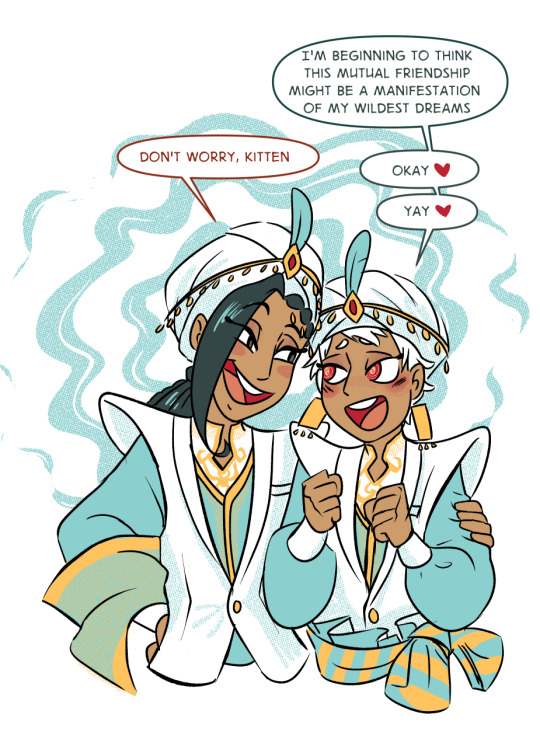
god where do i start
there's a whole essay to be written about how their dreams were just mirrors of each other because they're too fucking obsessed with each other to imagine life without each other, that Jamil keeps dream-Kalim around in his perfect world when he could have just conjured a life without him, where's he's fucked off forever, or where they never met? Explain to me WHY dream-Jamil is a horrifyingly chipper, overly-friendly parody of himself but still brainwashes Kalim instead of just pouting and saying "noooo kalim dont wake up you're so sexy we're best fwiends haha" which I can't not read as implying this is something he's fine with? has been fine with?? (we got a hint about the conditions of the manifestation of Jamil's signature spell! we've long known Kalim's been sworn to secrecy about it and he takes that promise so seriously that Jade couldn't get it out of him but like!! I still want to know the details!!)
That they had the most ridiculous shonen jump little boy slapfight because they're both SO stunted and they've been together forever but they never got to be normal-ass kids about it and they finally got to air their grievances with each other because they're trapped in a dreamscape where there's no repercussions to finally just throwing hands and calling each other names? That when push comes to shove Jamil still instinctually puts himself in danger and pushes Kalim to safety?
there's an essay to be written but I'm simply too yaoi poisoned to be the one to do it, I'm sorry. My only note is that I think the fight should have devolved into sloppy makeouts.
#jamil viper#kalim al-asim#jamikali#twisted wonderland#twisted wonderland spoilers#twisted wonderland jp spoilers#sorry idk what the appropriate spoiler tags are#art tag
551 notes
·
View notes
Text

Naruto most likely sees how the world around him works, and it affects his behaviour, especially since he craves for acceptance.
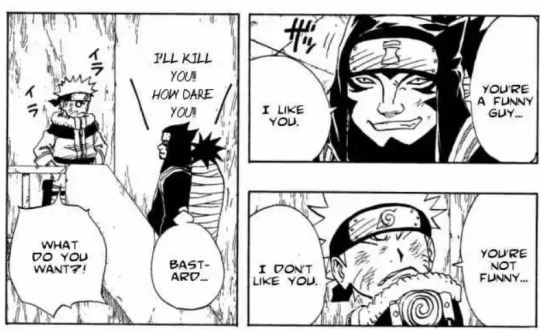
Notice the difference in his reaction when another guy says he likes him in part 1 vs part 2.
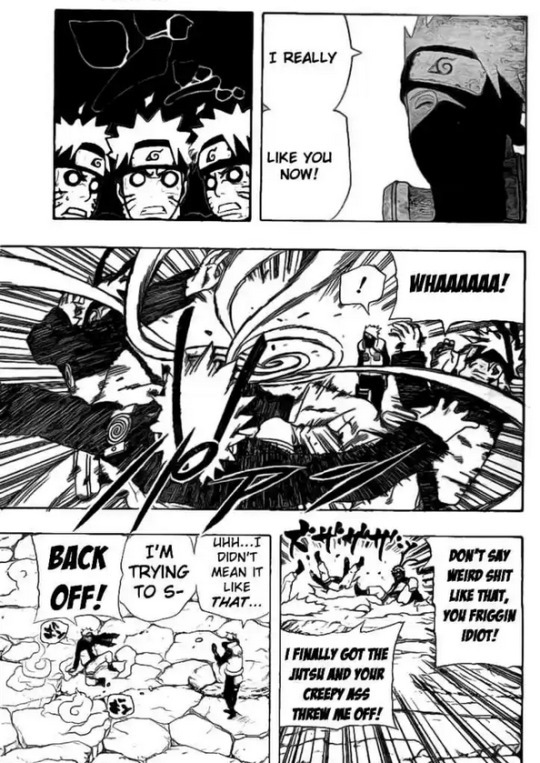
(Sorry for a bit poor quality, it was difficult to find an accurate translation, most were viz translations which didn't convey this convo very well). In part 1 he's just annoyed, because he doesn't like Kankurou as a person. He didn't even think about that "I like you" could have certain other implications. But in part 2 he's straight up creeped out by Kakashi saying the same thing, eventhough the meaning and intention is the same in both.
Naruto's reaction to Kurama mentioning his kiss with Sasuke was also way too over the top. Like really comical. Naruto was putting on a show in front of everyone. But whenever he's with Sasuke, he forgets all about this, he is fine with waxing poetry to Sasuke, or Sasuke being close to him...
My guess is since he went through puberty he also learned things about himself and thus started to become more sensitive to such things. Thus internalized homophobia.
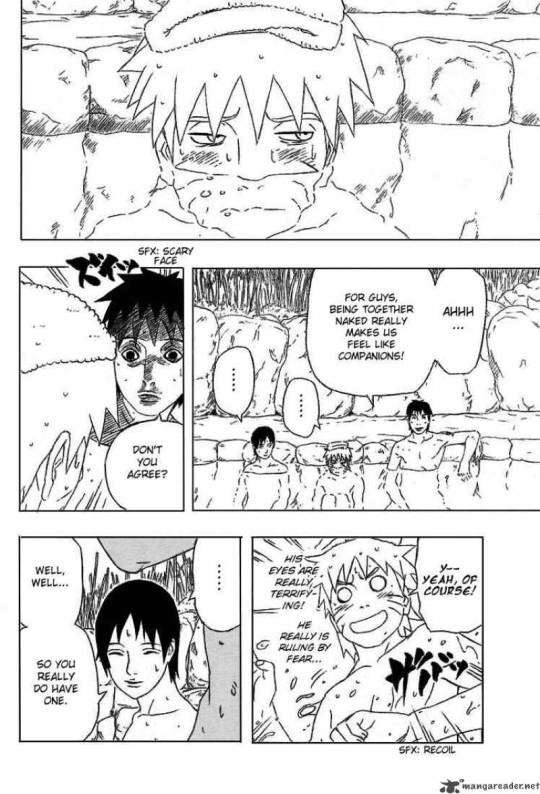
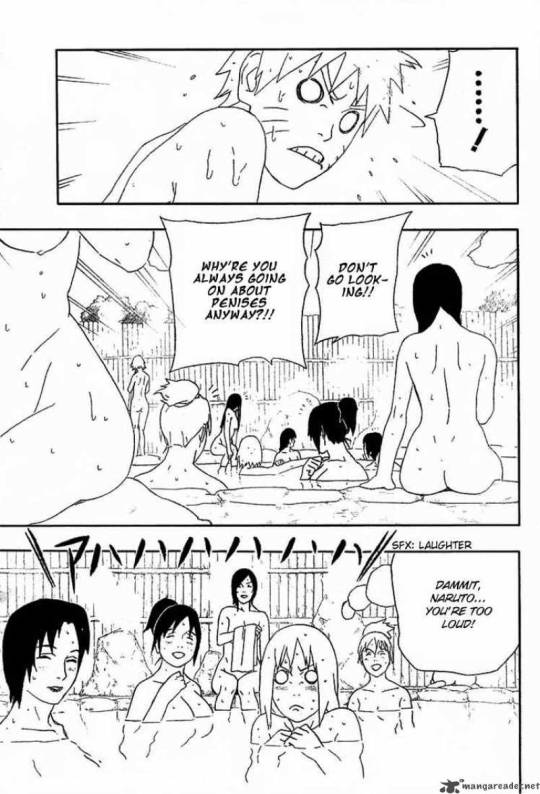
Take this scene for example. He seems a bit uncomfortable being there. Sai was probably made to be like this (inappropriate, talking about p*nis all the time, being compared to Sasuke, challenging Naruto about his fixation on Sasuke) so Kishi could introduce more such themes into the manga. He's rather clever about this.
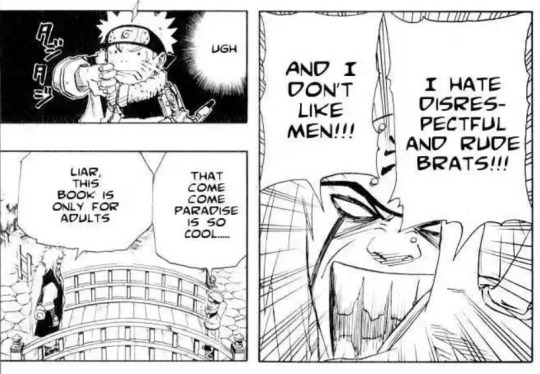
Another guess (it could be both combined) would be that since Jiraiya is so aggressively straight man (to the point he has to introduce himself by saying he's not into men lol) living with him for those years during the timeskip could have affected Naruto's mindset even more. But it's funny how Kishi keeps stressing over and over how Naruto finds Jiraiya's er*tic books boring. Also unlike Jiraiya who peeps on women for p*rverted reasons, Naruto does it as a prank, and in order to practice his oiroke no jutsu. Kishi is trying to show how they are different. I remember on one discussion forum one guy actually brought up he noticed Naruto's changed behaviour after he came back with Jiraiya! Like that he was even more gay and more sensitive to gay things. See, other people notice too.
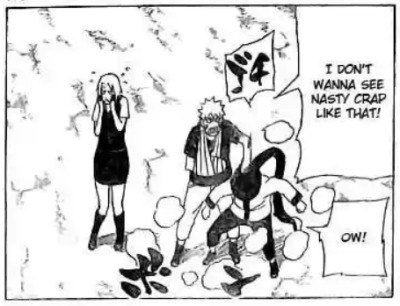
Then he calls Konohamaru's boy-on-boy jutsu "nasty". Naturally, it's a shonen, Naruto can't have a comically interested reaction like Sakura to something like that, it wouldn't fly. Thus the internalized homophobia. But I also think he didn't want to see Sasuke who he's possessive over being with Sai like that lol. And Naruto really isn't one to talk considering what he came up with later.
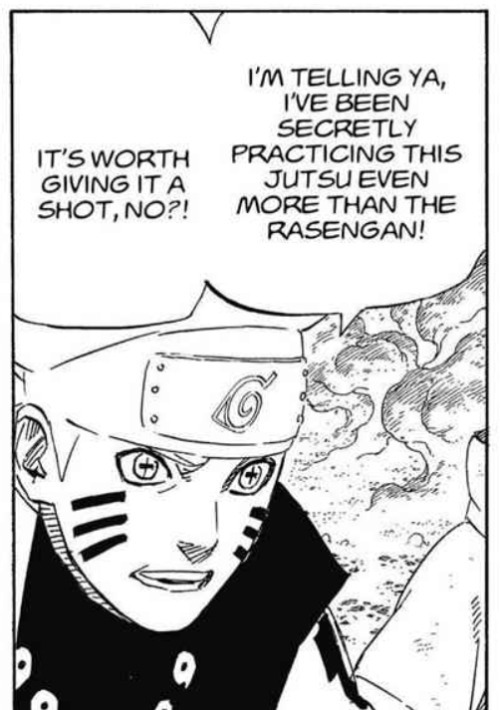
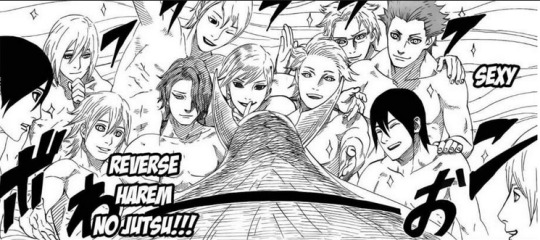
Look how proud he looks. Little hypocrite. He's been working on those twink bods more than rasengan lol. Kishi wasn't very subtle with that comment. Also Kishi fought for this moment with his editors for YEARS because he just really needed to write this down. It was just that important to him...

Of course Naruto's repression comes up when it comes to Sasuke as well. Here he admits Sasuke is attractive, but then immediately backpedals on it. His real feelings just slipped.
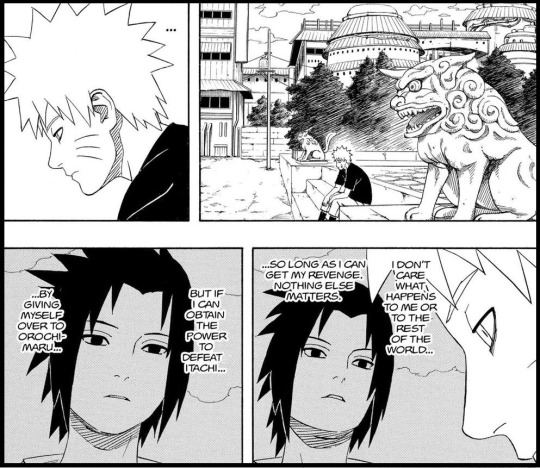
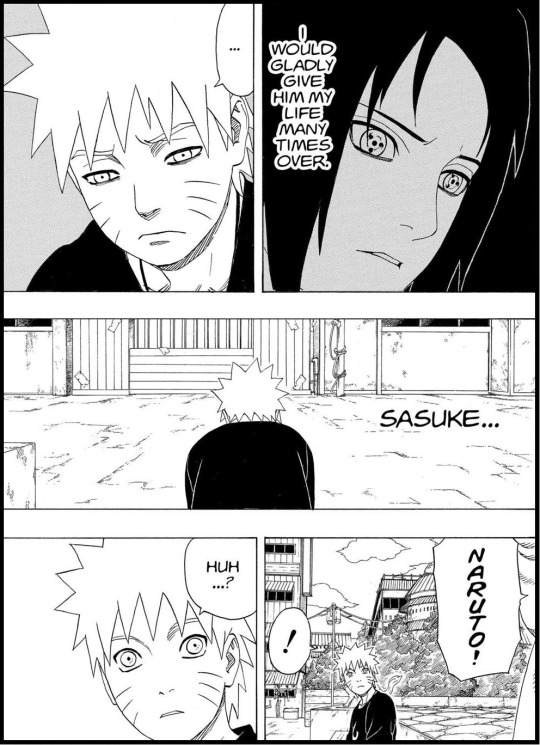
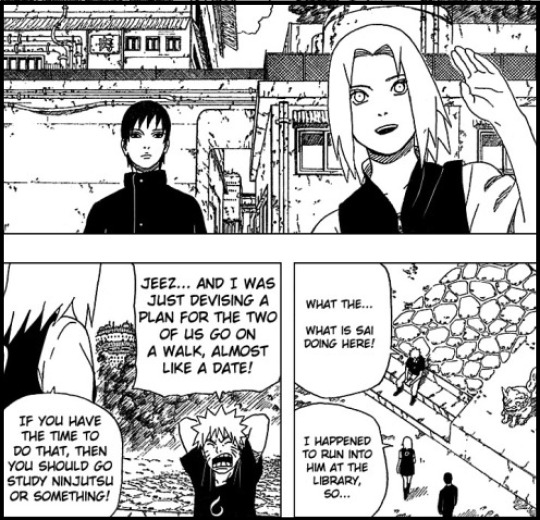
Later, he was thinking about Sasuke, his mind consumed by Sasuke, but when Sakura and Sai appear his whole body language changes and he immediately claims he was thinking about a date with Sakura. He didn't want to be vulnerable nor let anyone know about his real feelings at the moment. He is hiding behind a heterosexual facade.
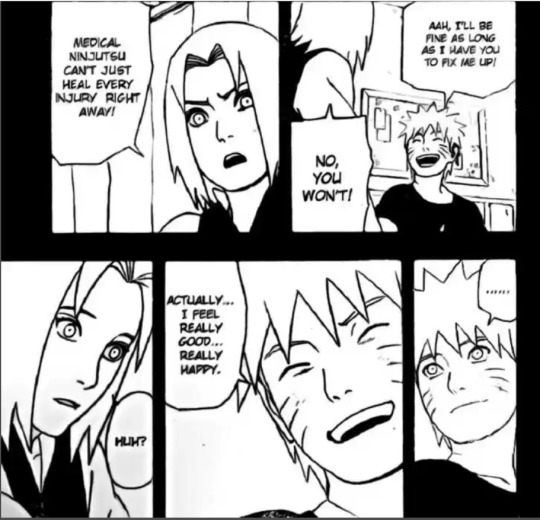
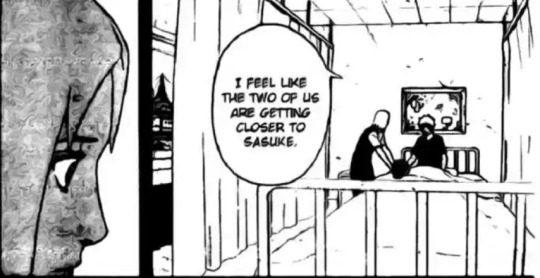
But sometimes Naruto doesn't even think of backpedaling on it. He is with his supposed "crush" yet unlike anyone else who would try to get closer or maybe flirt, he is just thinking about Sasuke. This is actually a moment that made many people raise their eyebrows. Including people who didn't like narusasu, or people who didn't ship anything. Specifically because it's written like a clickbait, as in Naruto says "he is happy" and Sakura going "huh?" and because she's his supposed crush who is taking care of him as I said most readers would expect next page have Naruto say something that would emphasize his crush on Sakura. But no, he goes on about Sasuke. No matter how much ss/nh insist we see gay everywhere, many other people picked up on Kishi's writing at many points during the story. But anyway, even with the internalized homophobia, Naruto's love for Sasuke is so strong he can say crazy things about Sasuke to other people and to Sasuke himself that things like "I'm starting to like you" (a completely average thing to say to another person) can't compare to, and still be unbothered by it.


Finally there is the interaction with Minato. Naruto wants to look good in front of his dad so he hesitantly agrees Sakura is his girlfriend, despite how in the previous arc we were shown that Naruto knew Sakura still likes Sasuke, and was angry at her when she tried to confess to him. So he is obviously not serious about Sakura being his girlfriend, but he is saying it to Minato hesitantly. Yet when his dad is leaving he doesn't want to lie anymore.... but he's also hesitant about admitting he hasn't found a girl like his mom wanted.
About the last part, I think it's referring to the armadillo scene? I think it was Kishi's typical humour, like how Naruto saw Haku in makeup and feminine clothing, and assumed Haku was a girl, but then was told Haku is a boy and went "oh okay, I didn't know that kind of thing existed". Here there was instead an armadillo that somehow looked like it was wearing makeup (??? idek or at least looked feminine) and since Naruto needed to write down whether the animals were boys or girls (a ridiculous cover up mission they made up to hide the war was going on from Naruto lol) but then it was flipped over with everyone else and Naruto saw its p*nis and went "even if heaven and earth switched places, a male is still a male". I guess Kishi likes this kind of thing lol... his d*ck jokes...
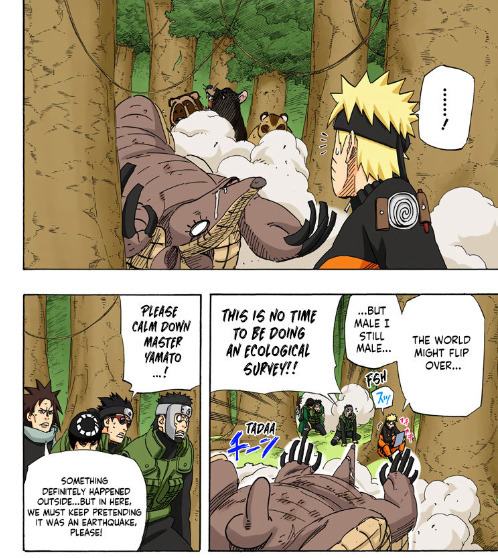
I know it says "the world might flip over" here but I know it's actually that proverb "even if heaven and earth switched places" that's often used in Japanese.
EDIT: this got flagggged by tumblr so I had to edit sus words.
325 notes
·
View notes
Text
This is probably a weird note to end my time with MHA's run on; but I find it so strange how I still see people calling Tomura out on just being a destruction-hungry villain with supposedly no plan or follow up...as though he is unique for that simplicity. Especially after the ending we got. Like, Deku and All Might never really had a plan when they were reshaping society by beating up the enemy and everything worked out fine for them, but does anyone call them out for just using violence to mindlessly solve everything with no further plan? (Well, yes. Me. Right now.)

Because like, really thinking about it; how different was All Might's plan from the start of his career to take down AFO and become a symbol, and Deku's plan to end the villains and bring everything back, from Shigaraki's plan to end hero society and bring about a world accommodating to the League? It all seemed to boil down to the same basic premise of Step 1) Beat everyone & everything making things worse, Step 2) ...it all just kind of works out from there. (I guess All Might planned on being inspiring and uplifting, but then we could also count Tomura's plan to be imposing and...uplifting but for different people. Deku was winging it every step of the way though.) Everyone's getting on Tomura's case for doing nothing but destroying; but all evidence from when the heroes do it suggests violence & destruction works. And it just never fails to bug me when people call Tomura out for stuff that's fine when heroes do it.
Which, yeah, let's touch on how it did just work out for Deku that way for no logical reason, least of all anything he planned. He punched out the big bad just like All Might and now things are like a hundred times better than they were under All Might with no more Tenkos abandoned in the street. If stuff like that just happens if you punch out your enemies hard enough, then why couldn't that happen for Tomura? Maybe if he had destroyed the government & hero society it would've, idk, been so fear/awe-inspiring that all the villains would've been nice and cooperative under the PLF and everything would've been fine. Or something. No more contrived than what we saw with the old lady plot line, MHA is just a series where that stuff works out. Heck, one time it actually did just work out that way for Tomura:
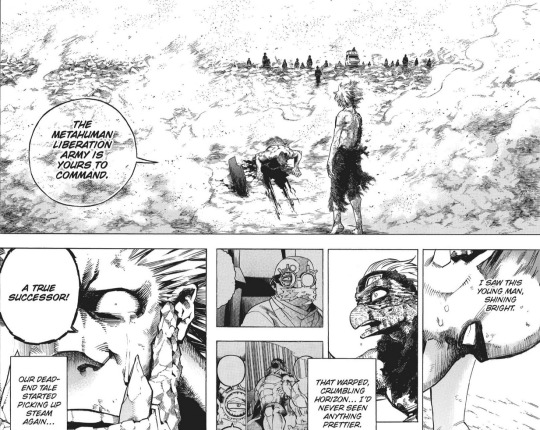
Again, violence and destruction works in MHA. I mean; duh, it's a shonen manga.
Plus all this is ignoring the fact that, unlike those two, Tomura did have a follow up to the violence. He did have a step two, or at least one & a half, after "beat down all the bad guys in the country." Rather than just going "and everything will work out from there," he had his guys plan for the future so he could say "and Spinner, Toga, and RD et. all will make sure everything works out from there." (Admittedly, not much; but also, not hopes and dreams.) He did have a plan, it was just the plan from the Overahul arc, where he was last asked to have a plan: leave it to his allies.

And hey, that means it's actually better than what we saw from genius All Might and brainiac Deku. So why are we still, even after everything was over, acting like there's some expectation as a villain he didn't meet? I guess it's just in the nature of a 'tantrum-having man-child who wants nothing but destruction' to put more forethought into the future he wants to build than the society-uplifting greatest heroes.

That or maybe everyone had really detailed follow-ups for when they won that Hori never went much into, but that'd render this post a bit pointless so shhh.
#Getting the last of my thoughts on this series out#And they are to defend MHA's best character from slander to my dying breath. Well you know what? I wouldn't have it any other way.#bnha#shigaraki tomura#toga himiko#spinner#league of villains#lov#redestro#paranormal liberation front#PLF#midoriya izuku#all might#hero society#overhaul
211 notes
·
View notes
Text

wildly impressed that I have gotten more people complaining about ace attorney than people complaining about the m/f ship on the bracket. I got like one ask about that and they were chill but I'm having people asking for disqualifications in the finals
no that is not happening like half of the contestants weren't from shonen series I would love to stop getting notifications about this please
it is the actual finals and I am still getting people complaining about things not being "technically shonen" like buddy ace attorney would not have made it all the way to the tournament finals if I gave a shit about that
#not polls#I wish there was a way to reply on sideblogs with images but sadly there is not so we get this#you'd really think people would see “finals” and remember that means the contestants were not only vetted by the mod#but also made it through multiple rounds of actual voting#and that means they won't get disqualified for “not fitting the bracket” in the FINALS#everyone saying they voted sns because it's more shonen to them that's fine idc about that you're chill#but I do keep getting people saying nrmts shouldn't be here because they're “less shonen”#which is uh No#I feel like that niche blorbo tournament who kept getting asks about how they set up their polls#except like#less
19 notes
·
View notes
Text
Ranking 2024 anime, Pt. 5: #10-1
hey, this post is also available on my ko-fi, so please check it out and consider tipping/donating as i do this for free and am currently between jobs. you can find part 1 of the list here, part 2 here, part 3 here, and part 4 here. all of my seasonal reviews are on my ko-fi and under my anime reviews tag, mixed in with my occasional musings. thanks!
And we are in the home stretch! I didn't want to split up my top 10 like last year, so it took a couple days to get it all together. Thanks for your patience.
As you may have noticed, some of these reviews are longer than others. I've reviewed most of these shows before, so I didn't want to be too redundant while talking about shows I've already reviewed. You can, of course, go back and read my initial reviews in my previous seasonal roundups.
Also, I just wanted to quickly shout out a few shows that I haven't watched much or any of, but would likely have placed well in these rankings, namely Dead Dead Demon's Dededede Destruction, YATAGARASU, the Spice and Wolf remake, Orb: On the Movements of Earth, Sound! Euphonium's third season, and the late Akira Toriyama's SAND LAND and Dragon Ball DAIMA. I only have so much time in a day, week, month, and year, but those series have been on my radar and I do intend to pick them up sooner or later.
But for now, let's focus on what I did watch. Off we go:
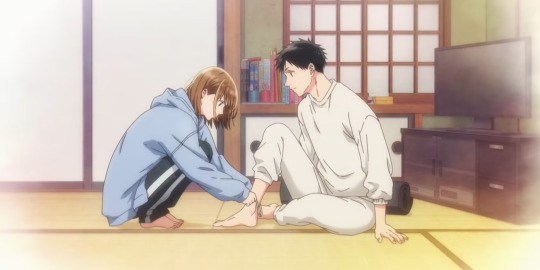
10. Blue Box
This is a slightly biased placement on my end because I picked up the manga this year and quickly fell in love with it, and I’m just happy that it got a faithful, well-made anime adaptation. If you have an issue with that, I’m gonna let you in on a little secret: This whole list is biased. It’s MY list, after all.
After an uneven summer output between My Dear Friend Nokotan and Suicide Squad Isekai, WIT Studio is in full form adapting Kouji Miura’s gorgeous high school sports romance. Rising first-year badminton player Taiki has a huge crush on his basketball star senpai Chinatsu, who practices in the same high school gym he does. He’s happy enough to keep a friendly distance as they improve at their respective sports, but that distance is closed significantly when her parents go abroad for work and she ends up moving in under the same roof as him. The spirit of competition is in the air, and is that a whiff of romance I smell as well?
The reason I felt the need to call out my own bias at the start is because Blue Box’s debut cour is, on balance, probably just “pretty good,” but I was just so overjoyed that this anime even exists that I was willing to overlook the early story’s growing pains. Taiki, of course, is the POV character for most of the first cour, and most of the romantic tension we see so far is entirely from his end as he swoons and huffs and goes into cardiac arrest over any and every gesture Chinatsu throws his way. You know, teenage boy stuff. There have been criticisms that Chinatsu doesn’t get much interiority for a bit and that she’s a bit of an enigma in terms of her role in the central “romance,” such that it is so far, which is a valid criticism of a lot of shonen romance stories. I’m generally of the mind that these things are more potent when the object of the protagonist’s affection is treated as more than a puzzle for him to solve, but I think Blue Box does a fine job of establishing what Chinatsu means to Taiki before we do indeed begin to get a feel for how she operates and what she might think of him. If you found that part a little maddening early on, trust me when I say it’s worth sticking it out.
Regardless, the character writing is what made Blue Box such a hit in Weekly Shonen Jump. Taiki is a flat-out good kid, if a little naive, and his boundless determination to achieve and exceed his goals in both badminton and romance makes him easy to root for. Chinatsu is fairly taciturn, as mentioned, but that’s by design; she’s a notoriously difficult person to read, as even her friends and teammates note that they can rarely decipher what she’s thinking. She’s still an effortlessly charming character, and it’s not hard to figure out why Taiki’s got it so bad for her. The real highlight of the series, though, is Taiki’s classmate and longtime friend, Hina, a rhythmic gymnast and an absolute troll. She is an absolute delight in every scene she’s in, whether she’s knocking Taiki’s knees out from under him, focusing on rehearsing her next routine, or prying into Taiki’s love life and realizing that, oops, she really cares about him too. Hina is wonderful and I just want the best for her.
Characters this likable will need the voices to match, and I am over the moon about this show’s casting. Shouya Chiba is tremendous as Taiki, in a far cry from his Epic Based Stoic Chad role as Ayanokoji in Classroom of the Elite. Every line read for Taiki sounds exactly as gung-ho about sports and devastatingly down bad for his crush as you’d expect of a hormonal 15 year old. Reina Ueda is terrific as the soft-spoken Chinatsu, but I’m looking forward to hearing the always-delightful Xanthe Huynh (Haru in Persona 5, Marianne in Fire Emblem Three Houses) take on the role in the dub just as much. Akari Kitou channels much of the same gremlin energy she did for KamiKatsu to portray Hina’s mischief, and I look forward to hearing her nail Hina’s excellent upcoming character moments. And although it’s a secondary role, the casting I was most excited to hear was Chiaki Kobayashi (Mash in Mashle, Stark in Frieren) as Taiki’s teammate Kyo. Kobayashi’s languid tsukkomi affect was exactly what I had in mind whenever Kyo would put Taiki’s lovelorn antics into stark relief in the manga. It’s like he was born for the part.
This show looks tremendous, perfectly adapting both the angular, doe-eyed character designs from the manga as well as the lower-detail gags. The pastel color palette and gorgeous lighting effects are exactly what I was hoping for while reading the manga. If I have any complaint, though, it’s mostly that I want to see more of the sports action. The granular details of the badminton matches and basketball games are hardly the focus of the story, but the action panels are usually the best part of Miura’s art in the manga. Shot-for-shot, it certainly does hew close to the manga presentation, but it’s mostly a racquet swing or close-up jump shot followed by an onlooker’s reaction. I’d have liked a bit more follow through. The CGI used for background competitors can get a little distracting after a while, too, but it’s easy to forget about.
Blue Box is continuing into 2025, and I’m waiting for every new episode with bated breath. If you liked the first cour enough but still have doubts, trust me when I say it just keeps getting better. I look forward to coming back to the second half of this season in another year for my victory lap.

9. Girls Band Cry
This is one of the most inventive girls-band anime out there, certainly the most so since that one from 2022 that I swore I wouldn’t bring up by name. Gorgeous 3D-CG animation, stirring original music, and a compelling cast of characters combine to make Girls Band Cry even more than the sum of its parts.
More than anything, I think what makes Girls Band Cry a terrific showbiz series is that it depicts the uncomfortable reality that a lot of artists are just flat-out unpleasant people and often don’t mesh well with one another. Protagonist Nina is messy, stubborn, and angry at the world and her parents and will not hesitate to make it your problem. She butts heads with her friends and bandmates at any provocation, but stubbornness is a major driving factor in the plot: Each of the five members of Togenashi Togeari has something they’re trying to move on from with their music, and while they each have an opinion on how to get there, they do come to realize, after a lot of silly yelling matches, that they want to do so together.
As a vehicle to push Girls Band Cry and Togenashi Togeari as a real-world multimedia experience, this show is a success. It’s a terrific-looking show in ways we rarely see outside of Studio Orange productions (and allegedly Love Live! Sunshine!!, which director Kazuo Sakai also had a hand in); the 3D computer-generated character models and animations are terrifically expressive and lively, and creative visual effects add a compelling sense of synaesthesia to Nina's emotional highs and lows. The voice cast, all pseudonymous contest winners, are also the real-life band members, and they fully nail both elements of their roles. TogeToge’s music in the show is terrific, and as an already-existing Gorillaz-esque virtual band, I’m excited to dig into their back catalog.
Girls Band Cry finally got an official English translation, so there’s no longer any excuse to sleep on this one. It’s funny, it’s heartfelt, and above all else, it fucking rocks. Don’t let this one fade away just because you might’ve missed it when it aired.
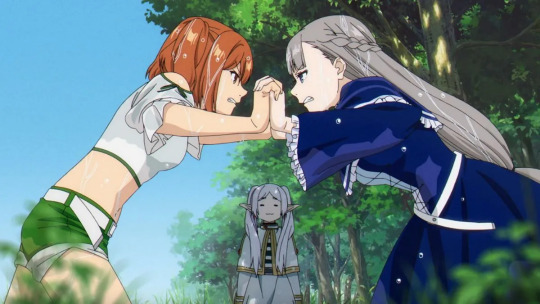
8. Frieren: Beyond Journey’s End, second cour
When I ranked the first cour of Frieren as the best anime of 2023, I wrote:
The debut season of Frieren will continue into 2024, and if the quality remains a constant, it could very well be one of the best anime of next year too. It has remained as MyAnimeList’s top-rated anime ever for its entire run, warding off the legion of Fullmetal Alchemist Brotherhood fans. Frieren deserves it.
A year later, it is still MAL’s top-rated anime, and by a healthy margin. Another 12 episodes aired to kick off 2024, and it was indeed one of the best anime of this year as well. I stand firm in my convictions that not only is it one of the best anime of the decade so far, it’s one of the best anime I’ve ever seen.
I really shot my wad by praising Frieren so profusely midway through its run, to the point where I still don’t really feel the need to add much more here. The second cour mostly focuses on the First Class Mage exam arc, allowing us to learn more about the present state of magic in the modern day and adding some much-needed depth to the cast. It continues to strike a lovely balance between the quieter moments and bonkers action sequences, as well as the more serious moments with laugh-out-loud goofiness. It may be a lesser arc in this story, but it would be a standout in so many others.
If I haven’t been clear enough, I remain over the moon about Frieren. The second cour looks and sounds just as incredible as the first, and this show’s success should serve as a reminder to the industry that investment in quality pays off. Madhouse knows they have a banger on their hands, and if the next season can maintain this level of production value for the major arc that is still to come, Frieren may very well earn GOAT status. Even if another season somehow never materializes, I’ll still be talking about this season in five years when it comes time to talk about the best of the decade. Watch this goddamn show.
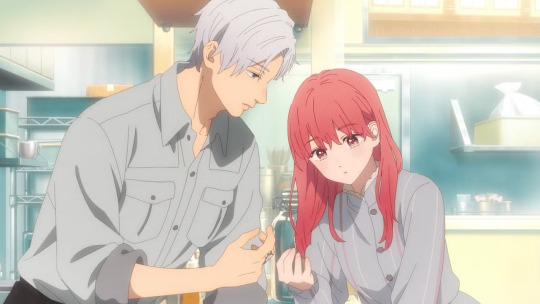
7. A Sign of Affection
For all the romance anime and manga I consume, I’ve shamefully been lacking on the shoujo/josei front. I really gotta fix that. If reading more shoujo was what spurred Yukinobu Tatsu to make DanDaDan, then who knows what it might do for me? A Sign of Affection isn’t my first shoujo, strictly speaking, but it does feel like one of the first I’ve seen of the good old-fashioned flowery romance type.
What a gorgeous show. A Sign of Affection looks terrific, sounds terrific, and above all feels terrific. This is just a lovely, fluffy romance with low stakes and easy payoff; just two pretty people getting to know each other and learning to overcome their differences. It’s low on gimmicks and plot contrivances, and for as much as I like romcoms and romance stories with a unique bent, I love a good straightforward romance just as much sometimes. Everyone looks beautiful and likes each other and Jesus Christ look at the lips on these boys. There’s even a double-date to Costco, and what better depiction of marital bliss could there be?
I’m still pleasantly surprised at how this show handles the main character’s disability. Protagonist Yuki’s congenital deafness isn’t a single-note character quirk or a plot device to make her seem helpless; it simply is. It’s a part of her life that serves as the lens through which all of the people in her life see and treat her, and it leads to the only thing that resembles a major conflict in the show. Itsuomi, the main romantic interest, doesn’t baby her or walk all over her; he instead gently tests her boundaries while learning to accommodate her in a way to ensure her comfort. Her childhood friend Oushi, on the other hand, is very jealous of this development because he seems to feel entitled to her just because he did the bare minimum to accommodate her. The circumstances aren’t common, of course, but it’s a good lesson for a shoujo to have: Don’t settle.
My praise for A Sign of Affection mostly boils down to “it’s just really nice,” but it does “just really nice” so goddamn well. It’s fluffy, it’s comfy, it’s cozy, all of those adjectives that would set off my fight-or-flight response if I heard them from someone else, but I was enthralled by this show week in and week out. I can’t believe I neglected to start reading the manga, and I’m gonna have to get on that ASAP because I can’t wait for another season.
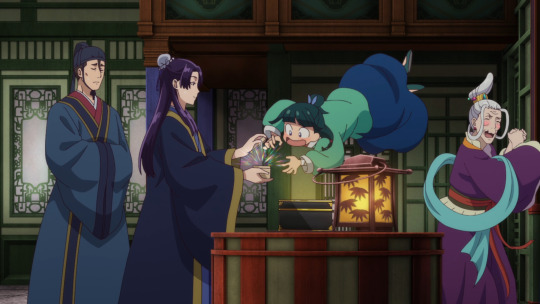
6. The Apothecary Diaries, second cour
I found myself more intrigued at The Apothecary Diaries at the end of 2023 than most other shows I’d watched that year. I grew more and more invested in the idiosyncratic Maomao as she investigated mysterious ailments and navigated imperial palace politics, all the while being a lovable little shit.
Before I’d realized it, though, the 2024 half of its run knew it had its hooks in me and took me for a ride. What looked at first like a series of one-off puzzles quickly began entangling into a much larger mystery, rapidly gaining momentum until exploding into a massive emotional payoff. So many of the small details in what you assume are episodic mystery-of-the-week mini-stories become relevant in unexpected ways and draw you in ever further. I adore this kind of lowkey long-term storytelling, and for it to be part of such an appealing package is basically catnip for me.
For as gorgeous as The Apothecary Diaries can be visually, sonically, and sometimes even emotionally, it’s worth mentioning that this show is also hilarious a lot of the time. Maomao is on permanent goblin mode whenever she isn’t carrying out official business, and any time the palace officials have to rein her in is a delight. The push-and-pull between her and Jinshi is endlessly entertaining to the point where I can wait forever for that payoff if I have to.
I neglected to read the Apothecary Diaries manga after the first season went off the air (though I nearly bought all of it sight unseen), and with the second about to drop, I guess I’m holding off for another six months. Can’t say I mind, though. I’m along for the ride and I want this show to keep surprising me for as long as it can. This is easily one of the best anime of the 2020s so far and I’m gonna be there front row center for every new episode.

5. Bang Brave Bang Bravern
People say “peak fiction” too goddamn often these days. Not that it was a meaningful term to begin with, but it’s been memed to hell and back and is mostly just thrown out ironically to mock garbage writing. To be honest, I’m not above it myself, but I prefer to ascribe it, even jokingly, to stuff that can only truly come from a brilliant and/or deranged mind. Preferably both. Peak fiction, to me, is the intersection where talent meets insanity, no matter the degree of either.
Bang Brave Bang Bravern is peak fiction.
I gushed about this show after the winter season, and I almost don’t want to say anything further about it, mostly for two reasons: Firstly, because I don’t really want to give the game away any more than I already did back in April, and secondly, because I think it may have permanently burrowed into a specific part of my brain and then melted it. All I’m left with is “this show fucking rocks, dudes rock, you need to see it, it’s peak, don't ask questions, just watch it.”
Indeed, Bravern is the Dudes Rock anime of the year, and an essential piece of Dudes Rock media. It’s Top Gun with aliens and a giant talking robot. And the robot wants to fuck his pilot. This show is loud, horny, stupid, and self-aware, combined just so into a cocktail of legitimate brilliance that is, for better or worse, unlike anything I’ve seen before or since. Nearly every single episode had me clawing at my hair and shrieking “WHAT THE FUCK AM I WATCHING,” and that is the highest praise I can give just about anything.
I might be overselling it just a touch, but Bravern is just as earnest as it is utterly wild. It’s an intentionally hilarious show, but it means everything it does and says. It’s a love letter to mecha anime and tokusatsu, and with its top staff sporting Gundam and Macross bona fides, that love oozes into every aspect. The mechs, both manmade and alien, all look tremendous, the music is a throwback to the goofy bombast you’d find in series like this as far back as the Showa era, and the ensemble cast outside of our silly leads are just as gung-ho and serious about Saving The World as you’d find in just about any other mech show. Anything that can be this goofy with a completely straight face is going to hook me in.
All in all, Bang Brave Bang Bravern is hypercompetent lunacy with heart. Call it weaponized genre awareness if you must, but it knows exactly what it’s about, grabs you by the collar, and takes you for a ride, all while doing badass tokusatsu poses and calling out special moves with silly names. This is legitimately what fiction is all about.
Also, if you don’t like Lulu just because she screeches a lot, you’re a weakling. Gaga-pi, motherfucker.
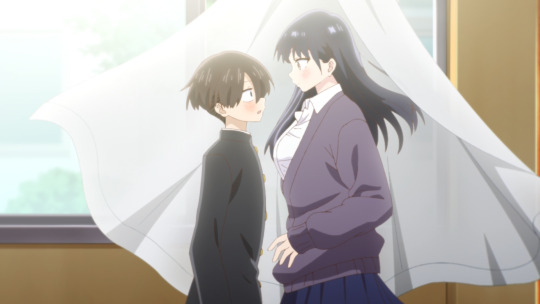
4. The Dangers in My Heart, season 2
This was a series whose first season was conspicuously absent from my 2023 rankings, but I caught up shortly after finishing that list in order to catch up to the second season. I’d watched a glut of slice-of-life romances in 2023 and figured I could afford to miss this one. I’m overjoyed at how wrong I was.
To paraphrase the second season’s exceptional OP, The Dangers in My Heart is indescribably beautiful. As I said with A Sign of Affection, I love me a straightforward anime romance, and this middle school slice-of-life is just that: Underdeveloped edgelord boy ends up making unlikely friends with, and falling for, the cheery popular girl in his class. This is easy wish-fulfillment on paper, but that’s hiding the trick: Kyotaro isn’t gonna get anything he wants by keeping his quills out for anyone who comes near, and he has some growing up to do if he’s ever gonna get what he wants.
Season 2 picks up right where the first left off, with Kyotaro’s arm still broken from his family trip and Anna feeling guilty because she thinks her distraction was what led to the injury. Right out of the gate, we see the care these two have developed for one another: Anna wants to help while he can’t do his own schoolwork, while Kyo is quick to try to cheer her up when she no longer feels like she’s able to. Already we’re seeing Kyotaro’s character development coming to light: The Dangers in My Heart isn’t a story about a Nice Guy getting the girl just by being there; it’s a story of self-improvement, of trying to become the type of person whom your crush would want to fall in love with. For a story about and ostensibly marketed to early teenagers, that’s a good lesson to have, and I absolutely devour stories like that.
As can be the case with plenty of adolescents, most of the conflict here is internal. Kyotaro spent the early part of his middle school education keeping a safe distance from everyone in order to avoid getting hurt, and as you can imagine, that did a number on his self esteem. Though he’s mostly kicked the chuunibyo mindset, Kyo still prefers to keep his distance, less because he doesn’t want to get hurt, but now because he doesn’t want to hurt anyone else. Specifically Anna. So much of this story is about him learning to be okay with letting people in and not just falling in love, but making friends and becoming somebody whom people just want to be around. It’s a chuuni rehabilitation story. You love to see it.
With all due respect to mangaka Norio Sakurai, the biggest surprise that came from reading the manga was how much better the anime looks than its source material. The anime looks tremendous in its own right, but compared to Sakurai’s doodly, occasionally messy style, the love put into the show stands in stark relief. Characters, backgrounds, and lighting are all soft, squishy, and warm, almost like the entire thing was run through the filter through which only a 13-year-old in love can see the world, even as a little edgelord. Little flourishes in the environment and music highlight the minute but consequential motes of progression in Kyo and Anna’s relationship. The OP ended up shaking out as my favorite of the year, even with 2024 being bookended by Creepy Nuts bangers. It’s that special to me.
And just like that, The Dangers in My Heart went from “eh probably not for me” to “yeah this is one of the best anime of the decade so far.” It’s a simple slice-of-life romance on paper, almost literally so in the manga, but this is a transformative adaptation. There’s much more of the story to tell, and I wouldn’t complain about more, but as it stands after two seasons, The Dangers in My Heart is damn near perfect as it is.
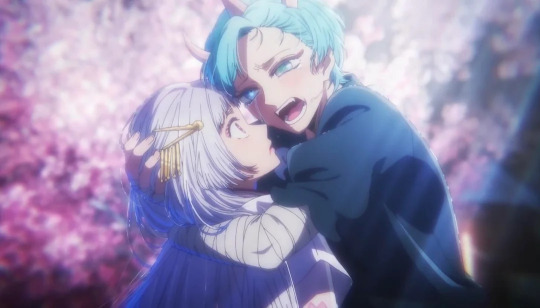
3. Oshi no Ko, season 2
Another year, another season, another top-four finish for one of the best manga adaptations I’ve ever seen.
The anime adaptation of Aka Akasaka and Mengo Yokoyari’s showbiz-revenge manga made shockwaves last year following its thunderous feature-length premiere, and its source material made even more waves due to some questionable plot developments that fortunately went nowhere. Doga Kobo was undeterred by any negative attention brought to the brand, though, and pressed forward into the next arc with a level of swagger you rarely see brought into an anime’s sequel season.
The 2.5D stage play arc in Oshi no Ko’s manga wasn’t my favorite, but it was one that you could tell just from reading it would translate well to the screen. Even then, I wasn’t prepared for just how hard Doga Kobo would go in adapting it. Character animation is sumptuously fluid, color used to amazing effect, and personal expression bursts forth into impressionistic abstraction to such a degree that it made manga artist Yokoyari cry. Everyone looks and sounds incredible beyond any way I could’ve imagined from reading the manga, which, at the risk of sounding defensive, is still very good as a whole.
This being a story largely about the music industry, the music remains as on-point as ever. It’s too soon to tell if the second season’s OP/ED pairing tops the instantly-iconic “Idol” and “Mephisto” from the first, but these are no slouches. This season’s OP, “Fatale,” is a whiplash-inducing banger by Tatsuya Kitani and idol Kento Nakajima, performing under the collaborative name of GEMN (itself a relevant name to the show; twins without the i/Ai, DO YOU GET IT???) with visuals that might actually top those of "Idol." The new ED, “Burning,” is Hitsujibungaku at their fuzzy, 90s-style alt-rock best, and it takes on a brand new meaning by the end of the season. Of course, there’s also the story-relevant music; while the bulk of the season focuses on the stage play, the last few episodes give us a glimpse into the pop music process, with the season capping off with an in-universe music video that, while not sonically my exact cup of tea, features 90 seconds of some of the best-looking dance animation I’ve ever seen in my life. That’s a flex if I’ve ever seen one.
And just like the first season, the second capped off with an announcement that Oshi no Ko will indeed be returning for another season. At this rate, and with the anime’s success, they will adapt the entire work, which will raise some eyebrows. I’m not going to litigate the manga’s later controversial developments nor its widely-panned ending, but if Doga Koba was able to handle everything that came before those things with such aplomb, I have faith that it will at least be done well.
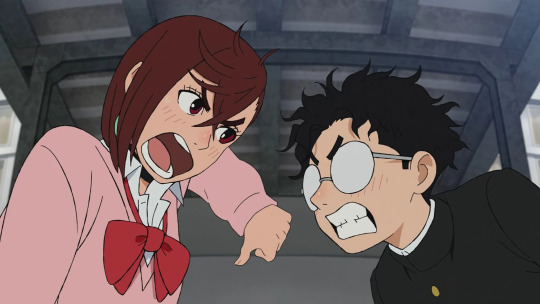
2. DanDaDan
I want to preface this by saying that I agonized over whether this or the final entry is my anime of the year. I’m comfortable with what I chose, but if I’m being realistic, DanDaDan is basically 1b. This is a masterpiece already.
Although the source material was a bit of a cult hit until this year, DanDaDan came with a considerable amount of hype. If you were even peripherally familiar, it wasn’t hard to see why: Yukinobu Tatsu’s art is absurdly detailed in almost every panel, character designs are easily recognizable (one of the leads dressing similarly to a Persona 3 character was fortuitous for the anime to drop in the same year as Reload), and so many bizarre things happen in the plot that relaying them to anybody who wasn’t already familiar would make their brain briefly touch the void. Above all, though, Science SARU was tabbed to animate it, and any project by them is immediately worth your attention.
Sure enough, DanDaDan made an instantaneous splash, its first episode adapting the manga’s bombastic, twisty 63-page opening chapter nearly beat for beat. I’m not gonna “don’t look it up, just go in blind” this one, but almost too much happens for me to properly detail it all without just writing a complete synopsis. It boils down to “lonely nerd boy believes in aliens, angry kogal believes in yokai, it turns out both are real and now they have to deal with it.” It’s silly, it’s wild, it’s action packed, and if you can stomach the sexually-compromising alien abduction of the girl, you’re along for the ride.
I’m not gonna harp too much on that last point. It does stink that the female lead, Momo, is stripped to her underwear for the sake of alien sexual “research,” but said aliens get their comeuppance before anything happens to her. It’s still not great, and it’s not the last time female characters are portrayed in their underwear, but I do promise it’s for story reasons, it takes a backseat to the onscreen action and is pretty clearly not done for the sake of fanservice. I know such things can be beyond the pale for some people, but if you think you can compartmentalize that, I recommend you watch the first episode with that caveat in mind and decide from there. You may be pleasantly surprised.
DanDaDan is effectively two stories at once; on one side, we have Momo and the boy, Okarun (a nickname Momo devised for him to preserve her own sanity), gaining wacky supernatural powers in order to fight back these occult threats and regain what was stolen from Okarun from his first encounter with the unexpected (IYKYK). Because these threats can come out of nowhere, their daily high school lives can completely pop off without warning. On the other side, we have quieter slice-of-life tension as Momo and Okarun get to know (and frequently misunderstand) each other and realize they are completely and hopelessly head-over-heels for one another.
Surprise, motherfucker: DanDaDan is a romcom.
Yukinobu Tatsu, formerly an assistant on the first saga of Chainsaw Man, long struggled to get his own work serialized. At his editor’s urging, he read something like a hundred manga for inspiration, including several shoujo romance series. That research shows through in DanDaDan; although the bonkers action sequences and off-the-wall monster designs are what draw in readers and viewers alike, what’s kept this many people along for the ride is the beating heart just barely under the surface in the form of the romantic tension between Momo and Okarun. It’s easy to write this off as some “lonely nerd gets the cute gyaru just by being a Nice Guy” wish fulfillment, but that’s not really the case here; Okarun was a weird little twerp right from the jump. Similarly to Kyotaro in the aforementioned Dangers in My Heart, Okarun believes early on that he’s nowhere near Momo’s league, completely unaware that she quickly grows to actually like having him around, so he puts in the effort to become a more well-rounded person so that he can be confident enough to be seen next to her. He also just wants Momo to think he’s cool, and she thinks that’s adorable. And she’s right! These two are cute as fuck together.
So you come for the wild action and stay for the tremendous character dynamics. It should go without saying that Science SARU nailed all of the above, but I’m gonna say it anyway. Reading the Manga+ comments on each chapter as I read through the manga, readers were begging a top-flight battle shonen studio like MAPPA or WIT to pick up the series, and I think these fans got more than they bargained for. Masaaki Yuasa hasn’t been in charge of a series at the studio since Eizouken, or anything they’ve put out since Inu-Oh, but his influence is all over their recent works, including last year’s fellow top-three series, Scott Pilgrim Takes Off. It’s beyond impressive how, much like Scott Pilgrim, this series manages to maintain the source material’s art style while still looking very much like a Science SARU anime. Everyone is bouncy and malleable as their moods dictate, line weights are wildly varied, and action animation is kinetic and unpredictable. Each fight with an alien or cryptid is awash in eye-searing color or eerie greyscale. The music is a boatload of fun as well; even putting aside the Creepy Nuts OP (banger after banger after banger from those dudes) and Zutomayo ED, regular proceedings are punctuated by a wildly varied score, from funk to folk to an insane chase scene set to an electronic mashup of the “William Tell Overture” and the can-can. Everything about DanDaDan keeps you guessing.
I was looking forward to DanDaDan enough that I went to the theatrical premiere of the first three episodes and was sufficiently blown away. If you’ve seen the show, it shouldn’t come as much of a surprise that it looks and sounds incredible in a cinema setting. I left the theater positively buzzing, telling anyone who’d listen that they had no idea what was coming, but even knowing the entire story, I wasn’t prepared for more of what was to come. The literal next episode after what I’d already seen in the theater had one of the most bonkers action setpieces I’ve seen since Gurren Lagann, and just three episodes later an unbelievable emotional gut punch, prior knowledge of the manga be damned. Every single aspect of DanDaDan as an anime was given the same level of love and care that Tatsu put into his own work. It’s one thing for an anime adaptation to be faithful to its source material, and another entirely for it to elevate and transform it. DanDaDan somehow does both.
If there’s anything that held this back from being the anime of the year, it’s that this season kind of just… ends. With the 12-episode runtime that was given to the debut season, DanDaDan ends its first run right after the beginning of the manga’s next arc, which feels bizarre. There’s no resolution, but there’s no real cliffhanger here either. Which I kind of get, the story is driven by a constant forward momentum, but a little warning that the season was ending would’ve been nice. It’s only a six month break until the show comes back, but judged on its own, the way this season ended left me feeling a bit cold and the season itself feeling incomplete. Even shows that have year-long breaks between cours rather than seasons tend to put some kind of cap on each individual run, but DanDaDan just kinda left the toilet unflushed, and next to it a Post-It note promising to come back later. For something this lovingly crafted, that seems like a bizarre oversight.
That was hardly enough to temper my enjoyment though. Anything this well-made is deserving of the attention and success it’s attained, but to have this story, with these characters and this level of bonkers action made this well, is just an embarrassment of riches. And God help me, I’m shamelessly greedy. July can’t come fast enough. I need all of it.
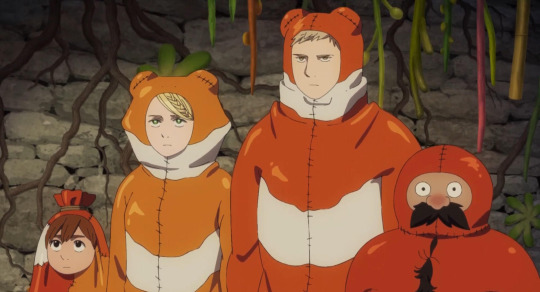
1. Delicious in Dungeon
At the end of its run midway through the year, I declared Dungeon Meshi the best anime of the year up to that point and that I’d be impressed if anything would manage to overtake it. Though the other two entries in my top three made extremely strong cases, nothing else quite hit the spot and nourished the soul quite like Dungeon Meshi.
Barely a year removed from one of 2022’s best anime, Cyberpunk Edgerunners, Studio Trigger kicked off 2024 with another Netflix original, this time with its first proper manga adaptation since the studio split from Gainax a decade prior. It seemed an odd fit at first to have a studio known for wacky, hyperkinetic action productions like Kill la Kill and Promare to adapt this quirky fantasy dungeon manga, but hey, they also did Little Witch Academia. It turned out to be an odd fit, but in the best way: Dungeon Meshi is pretty offbeat as it is, so for it to get picked up by one of the more oddball prestige studios ended up making a tasty stew.
I struggled to elaborate on what makes this show so good after each of its cours, and six months later I remain a little lost for words. It’s an exceptional story adapted exceptionally well. Between the characters, the story, the setting, the emotional stakes, the comedy, the highs and lows, they nailed it all. Trigger just gets it. Even when characters go off-model for the sake of an intentional animation quirk, it still has that inimitable Trigger charm to it. It sounds just as good as it looks, too: The orchestral score highlights the quieter, sillier moments just as well as the tenser action setpieces, the foley work behind the dungeon’s bizarre and varied flora and fauna is immaculate, and the cast is perfect in both Japanese and English (I rarely ever say so but seriously, shout out to the dub).
I’m just as sick of saying “this show speaks for itself” when I have trouble finding the words as you probably are of reading it, but I have little else to add here. I’ve written plenty already. Just go watch it. This is already one of my favorite manga ever, and by the time the series wraps up at the end of its second season, it will easily end up as one of my favorite anime ever.
#anime reviews#blue box#girls band cry#frieren#a sign of affection#the apothecary diaries#bang brave bang bravern#the dangers in my heart#oshi no ko#dandadan#dungeon meshi
99 notes
·
View notes
Text
Sometimes, I forget that there are people who find protagonists like Izuku, Tanjiro and Yuji "boring" because "they exhibit typical shonen protagonist traits" and one of them woukd be "They're nice, they're kind, they're all sunshine".
Which, okay, have your tastes, that's fine.
But when it comes to characters who are kind and/or nice, there's layers to them.
Just because a character is nice, doesn't mean they're kind and vice versa.
A character can be the most evil one in that story and still show kindness to some people somehow. A nice character may be the one to do immoral things, Yuji being an example.
The reasons for why a character is nice and/or kind varies, too.
Some are just genuinely born that one. Some may be selective as to who they show those sides, too, because of their own morality. Maybe, a character is being kind or nice to also manipulate others. Some characters may choose to be kind because who will, despite the cruelty of the world?
Also, I feel like, even with people outside of a fandom, they hear or seen a character being nice and kind, they just stop at that and don't think they're capable of being ruthless.
Like, Tanjiro canonically has a pure soul, but multiple times he has shown he is not only a menace in a fight, but he has shown to be one in casual situations. Sometimes, he's not even aware he is because he is so nice.
Izuku, he's a sweetheart, too. But even he will just shut off that "sunshine" to literally tear into you. He has been told in canon to hold back his emotions, the most prominent one being his anger. When he's angry, go apologize!
Yuji, look, let's be real... he is sunshine and rainbows, but that boy is probably the least sweetest one out of these three examples. Hold back? Yuji don't know what that is. No, no, he really don't. I kid you not, this kid doesn't. You can't even use the fight against Junpei as one because he punched Junpei UP into a window. Had Junpei not have that shikigami, he would have gotten major injuries.
My point is!
Just because a character is kind or nice or both, it doesn't mean...
A) it's the only trait they have.
B) they're not capable of not being kind or nice.
I think some see nice and kind and associate it with being "soft" in a derogatory manner.
Which, first off, there's nothing wrong with being soft.
I'll be honest, it will sound silly (go ahead and laugh actually, I encourage it), but if you asked put a character like one of the mentioned protagonists in front of me along with their villain and asked me "who I'm more scared of" I'm pointing at the protagonist.
Listen to me. Don't let that cuteness fool you.
With a villain, I am well aware of that villain being evil and will hurt me no matter what I do.
With someone like Yuji or Tanjiro or Izuku, they look nice, they look kind but it's like you have to be careful to not to trigger them in a way to set them off. You're caught off guard but those sweet faces and then next thing you know, BOOM! You got knocked out.
If anything, as much as people like to clown on these characters, they're only just following the footsteps of the ones before them.
Just like those legends, they started from the bottom and grew stronger over time and even with being a chill person or don't want to do evil, that doesn't exempt them from being not "a sweetheart".
I said it before, but a sunshine character to me is a character who is warm but lethal, like sunlight.
#shoot if anything i say some of these protags are a little crazier than the last ones...#like I'm sorry but they do things that I'm like 'OKAY WHAT THE FUCK?'#tanjiro out here headbutting the shit of people and taking sickles through.#THAT WAS PAINFUL TO LOOK AT#izuku could have killed katsuki in that first fight or just injured him badly#his fights... he knows to hold back because of his body AND honestly because of others#like when you think about izuku did have the capability to off someone#murder just don't be on his mind#yuji... listen he can throw cars and will do it enough said#he knocked out bullies like they were curses at like 13-14 years old and looked at the last guy with a glare so chilling...#it's like watching season 0 yugi all over#cute but then boom oh i could gravely injure you ha ha#just kiya's thoughts#bnha#mha#boku no hero academia#my hero academia#jjk#jujutsu kaisen#kny#kimetsu no yaiba#demon slayer#midoriya izuku#izuku midoriya#deku#itadori yuji#yuji itadori#tanjiro kamado#kamado tanjiro
54 notes
·
View notes
Text
Okay, so I received an ask in response to an MHA critical post I received last night that I originally responded to, but then decided to delete the ask and the original post because I didn't want to get into an argument.
However, I feel like I should address one of their complaints about a post I made last night. That I was being too dismissive on the cultural reasons for some of the writing choices Horikoshi made because I am obviously not a part of the culture that Horikoshi grew up in and is commenting on in his piece of work.
I tried not to dismiss the cultural reasons entirely in the post though, I just said I don't think you can entirely blame Hori's writing choices on them. My cited example was there are other shonen jump mangas that don't go out of their way to gruesomely kill their villains (which is what I'm taking fault with.) I understand that the death penalty is a common response to murder in japan, but within the realm of fiction of shonen manga doesn't have a trend of killing all their villains.
But yeah, that might have been a shallow argument.
So there are different lenses of fiction you can criticize Horikoshi's writing on, because every piece of fiction is in fact influenced by the culture it's in, as well as obviously the author's personal life and unconscious biases but that's not all. There's also genre to consider, and influences / inspiration the author might have taken from other works.
For example, there is also genre in particular MHA is written as a response / commentary to both western comics and classic shonen jump manga. Horikoshi said in an interview:
“Probably have to be Goku and Spiderman. To me, when mentioning heroes, these two are the ones that I think of. In Goku’s case, it’s the reassurance that everything is going to be fine he brings when arriving.”
There are multiple critical analysis lenses that you can analyze a story from. If you're talking about MHA from a feminist lens then you're likely to stick to topics relevant to that, like say japanese feminist movements. If you're talking from the sociopolitical angle then it's relevant to discuss collectivism, and especially how it inspired the Todoroki Family. However, my intent wasn't to dismiss sociopolitical reasons as why Horikoshi chose to write the story this way, but to say it's not the only reason that informs Hori's storytelling choices. MHA isn't just one thing it's multiple thing, me deliberately choosing to talk about MHA as a response to both eastern shonen manga and western comics is a valid critical lens to apply to the manga. You can talk about both obviously, but that was a pretty short post. Perhaps I didn't word my post the best but please try to be understanding that I can't make a post covering all of my bases on leaks night.
For a manga where Horikoshi cited his concept of heroism comes from Goku and Spiderman, they both don't kill their villains, Goku specifically let Vegeta live so if those are his inspirations the choice to kill every villain is weird to say the least.
I can make the argument that MHA fails as any kind of meaningful commentary on comics in general because it doesn't seem to understand the comics it is taking inspiration from. The X-Men are the underdogs in their story, not members of the privileged class they are the outcasts. Batman doesn't kill people because he believes that most of his mentally ill victims turned villains deserve a second chance and he can't dictate who deserves recovery and who doesn't.
If anyone reading this post is curious, here are posts by @siflshonen that discuss both the manga influences and comic infleunces easter and western infleunces on MHA, and also the cultural ones. They are also really long posts because those topics require a great length to discuss critically. This one is about MHA's manga DNA in regards to Bakugo's character, and specifically references Yu-Gi-Oh and Kaiba's character as well as Jonouchi as response for Bakugo's development arc from bully to best friend. This one discusses more about the nuances of collectivism. This one is in reference to the Todoroki family, it discusses both collectivism / japanese family roles / honnae and tatamae concepts that the Todofam is critiqueig, and also how Enji is inspired by eastern ideas of heroes while All Might is inspired by western ones. (Therefore it's not a wrong critical lens to compare MHA to other shonen manga and western comics because that is literally what the manga is taking inspiration from and commenting on).
Here's a powerpoint presentation by @sans-san that discussed Hegemonic Masculinity in Tokyo Ghoul in terms of work culture and how the CCG is inspired by that, which I think also applies to Enji's character as well.
This post by @bnhaobservation spoke about how the Todorokis decision for not disavowing or abandoning Toya after he was sentenced to life in prison would still be a progressive ending to the TODOFAM arc, and while I still wouldn't have been satisfied by that ending I'd at least be able to accept it. That is however, not what we got, we got Toya dying a slow agonizing death while hooked up to life support. So we could have still gotten a slightly softer ending where Toya's at least allowed to live that would have still been in line with the values of the culture that produced MHA.
This post by @bnhaobservation also talks about how the Todofam plotline can still be seen as progressive in some ways in regards to his criticism of Enji's parenting, because of certain outdated attitudes of parenting that still exist about Enji pushing Shoto to his absolute limits.
However, I don't want to debate the person who sent the ask, I just wanted to clarify I'm not trying to make a reductive statement that sociopolitical circumstances have nothing to do with Hori's writing choices, but that you can also analyze it from a lens of genre, commentary on comics and shonen manga, and also the predecessors he's taking inspiration from. All of these things have an inspiration on Hori's storytelling choices.
Since I'd rather not debate, now that I've gotten clarifying things out of the way I'm actually going to use this post as a book reccommendation.
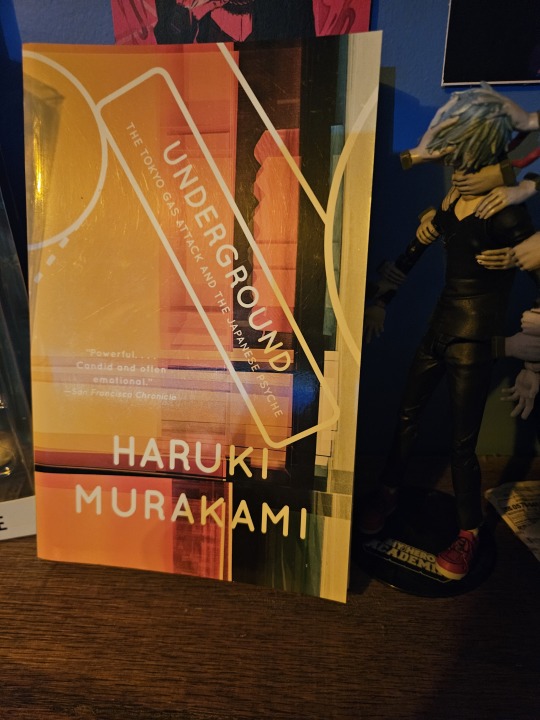
Here's Shigaraki with Underground, one of my favorite books. It is a non-fiction work from famed fiction author Haruki Murakami about the Saren Gas attacks.
On a clear spring day in 1995 five members of a religious cult unleashed poison gas in the Tokyo Subway system. In an attempt to discover why, Haruki Murakami talks to the people who lived through the catasrophe and lays bare the Japanese Psyche.
For those who are unaware the Saren Gas attacks were a terrorist attack where members of the Aum Shirikyo cult released saren gas in the public subway system. It is the biggest japanese terrorist attack in modern japanese history and at the time and even the modern day it was a great shock to them as a whole.
The book consists of several interviews with the victims of the attack, and they are incredibly harrowing to read I remember crying while reading this book multiple times. However, at the end of the book after giving considerable time to let the victims share their stories Haruki Murakami also devotes space in the book to interviewing former members of the Aum Shirikyo cult.
Haruki clarifies his intent in his decision to include testimonial from the cult in the afterword of the novel. "As I worked on this book I attended several of the trials of the defendants of the Tokyo Gas attack. I wanted to see and hear those people with my own eyes ad ears, in order to come to some understanding of who they were. I also wanted to know what they were thinking now. What I found there was a dismal, gloomy, hopeless scene. The court was like a room with no exit. There must have been a way out in the beginning, but now it had become a nightmarish chamber from which there was no escape. [...] To all of them I posed the same question, that is, whether they regretted having joined Aum. Almost everyone answered: "No, I have no regrets. I don't think those years are wasted" Why is that? THe answer is simple - because in Aum they found a purity of purpose theycould not find in ordinary society. Even if in the end it became something monstrous, the radiant, warm memory of the peace they originally found remains inside them and nothing else can replace it. [...] However, as I went through the process of interviewing these Aum members and former members, one thing I felt quite strongly was that it was't spite of being part of the elite that they went in that direction, but because they were a part of the elite. [...] However, we need tor ealize that most of the people who join cults are not abnormal; they're not disadvantaged; they're not eccentrics. They are people who live average lives (and nmaybe from the outside, more than average lives), who live in my neighborhood and yours.
Haruki interviews members of Aum Shirikiyo because he wants to make the point that the people in these cult aren't from a dangerous fringe element of japanese society, but rather they are normal people, some of them even highly educated. The capacity to commit those crimes exists in normal people, and also the capacity to fall victim to a cult.
The Ikuhara anime Mawaru Penguindrum is heavily inspired by both the Saren Gas attacks and the questions that Haruki Murakami asked in the Underground. Fully covered here in this article: Exploring Mawaru Penguindrum 2011 from a historical, cultural and literary perspective here.
Underground was Murakami’s attempt to interview survivors of the Sarin Subway Attack. Apart from learning the perspectives of ordinary citizens involved in that shocking incident, he also managed to interview several members of Aum Shinrikyo and tried to get their point of view on the matter. (In the Japanese edition of the book, the interview with the cult members were published in a separate book, titled The Place that was Promised.) It was an important piece of journalistic work that criticized the public’s attitude of questioning what happened, instead of asking the proper question of why it had happened. In the anime, viewers knew that an event took place in 1995 that affected all the characters, but what exactly was the event about? Why did the people do that? What social factors attributed to the occurrence of such event? These are the questions that Mawaru Penguindrum asked, and one that we were left to ponder on.
Ikuhara and Murakami both exist in the same culture as Horikoshi, Haruki is an incredibly prolific japanese author and he was born in 1945 but both of them are able to ask more meaningful questions about the society they live in then Horikoshi accomplishes with the league of villains and the todoroki family. Haruki Murakami emphasizes the humanity of the aum shirikyo members and that they are not lunatic fringe members, and Mawaru Penguindrum is about the extreme social pressures that people especially children can be a victim of.
Literature is influenced by the culture it takes place in, but it's also a response to that influence and the piece of art that Horikoshi wrote just isn't as thoughtful of a response than what was written by both Ikuhara and Murakami.
More book recommendations if you're interested. The Setting Sun, by Osamu Dazai. Pachinko by Min Jin Lee. How do you Live? by Genzaburo Yoshino. In the Miso Soup by Ryo Murakami. People who Eat Darkness by Richard Lloyd Perry. Night on the Galactic Railroad by Kenji Miyazawa (I'd argue this is an example of good collectivism). The Memory Police by Yuko Ogawa. Out by Natsuo Kirino. There was a couple more I wanted to include but they had cannibalism in them so I thought it better not to reccommend them.
90 notes
·
View notes
Text
The Mechanisms of Nobara's Return
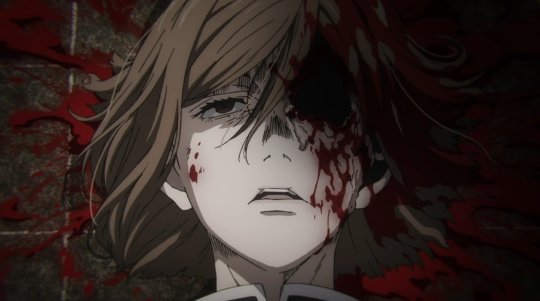
The Setup
Her injury is the smallest transfiguration Mahito made without interference
This injury didn't kill Nobara instantly
Nitta used his CT to stop her from dying
Affirmation that Nobara has a chance of survival even if that chance is less than 1%
This setup itself is the biggest indication/confirmation on a meta level that Nobara's return will happen. Because otherwise, Gege wouldn't have written it like this in the first place or he would've written later scenes about her death more explicitly.
Nobara is the female lead of JJK and is often compared to Sakura from Naruto in that regard. I find it hard to believe that Shonen Jump would let Gege discard that lead so early in the story. It would also be an unpopular decision to replace the female lead with another female character (Maki) even for Shonen standards.
Temporarily replacing one on the other hand, is a decision I can see happening. I'm no expert in this but it's known that editors keep the number of female characters low in their titles in SJ. Gege most likely wanted to do something shocking as well, so this a course of action many would be fine with.
If Nobara's death had been meant to be final then not only in the story but also outside of it we would've gotten definite confirmation on it. Instead, I don't recall something like that being said. In story and outside, we have this wishy-washy Schrödinger's Cat situation going on.
Her injury

Idle Transfiguration cannot be healed with positive energy or any other means
That's because positive energy doesn't recognize damage to the body if it's in the same shape as the soul
At this point, her death was suspended in a similar fashion to how Megumi's death was suspended inside his exorcism ritual
This suspension can theoretically be kept up indefinitely as long as Nitta can use his CT
A popular theory in this regard, is Nobara learning Reverse Cursed Technique while at death's door.
Nobara is a Black Flash user, her use of cursed energy is more refined than that of the average sorcerer
Her learning RCT would parallel Gojo learning it after being sliced open. For her, it just takes longer
Having to use RCT constantly would also mirror Gojo, bringing her narratively closer to her teacher after being the one most distant from him
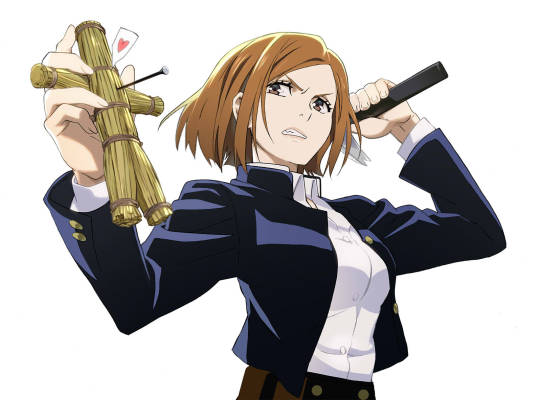
Her Return
Why did Megumi say she was dead?
Theory: because Shoko told him that she was dead:
Because Shoko thought it cruel to keep the hopes of Megumi and Yuji up. She still wasn't finished to try and save her though
Shoko was afraid of the higher-ups interfering in her treatment after Yaga was executed
Having Megumi believe that she died also makes Sukuna believe that she's dead, which makes her comeback unforeseeable to him.
Why don't we see her in the flashbacks?
To keep up suspense. But do you know who else we don't see in the flashbacks? Todo. And that guy isn't even dead.
What is she doing now?
We have some possibilities for the flashbacks:
Learning to function under her RCT
Learning to function on Nitta's CT
Training/secret missions with Todo
Recovering with her grandma/learning to use new forms of her own CT
For the current fights:
She's waiting her turn
Popular theory is that Nobara will use Resonance on Sukuna's last finger. If she does this too early, she will explode. My favorite way for her to do this is like this:
Utahime and Gramps will enhance her CT and she will attack Sukuna's finger right at the moment when Sukuna attacks Yuji to kill him, mirroring the Mahito scene.

Which are the instances where her death wasn't made explicit?
We never saw her corpse
She wasn't at the airport
No one talked to Gojo about her death, they only talked about Nanami
Only Megumi and Yuji talk about her death. The second and last time about Hana potentially replacing her

I think this is about it about Nobara's Return. If you have questions, I will answer.
...
I lied.
There is a way to heal Nobara.
And the person who's going to do that is Megumi.
Megumi will have to infuse one of his shikigami with Mahoraga's Adaptation ability
The Adaptation doesn't happen with CTs, it happens with phenomena
A transfigured body and soul is a phenomenon
After the adaptation, Megumi can order his shikigami to reshape or reverse the transfiguration
This Adaptation to Idle Transfiguration also has a second use: stopping the merger (or reversing it).
Kenjaku used Mahito's IT to change Tengen's barriers. If I remember correctly, he will use IT again in the future or the effects of IT will be relevant later on. And that's when Megumi will have his biggest role.

171 notes
·
View notes
Text
I think the reason for all that discourse in the JJK fandom is that we had some expectations about what this story would be about, and we were wrong. I'd say it was our fault for having them, because Gege had his own story in mind and it isn't our role to tell him what to write/draw. But I'd also say that we were misled into having those expectations and then being deceived, because shock value is fun.
(I'm not in the AOT fandom so maybe I'm 100% wrong, in which case don't pay attention to me. I'm just rambling I'm not trying to make a point)
See there's not such a thing in Attack On Titans. I mean I know people are arguing whether a decision was good or bad or a character development was positive or negative, but no one is rioting the way JJK readers are even when someone dies, kills, or does worse (they do start a genocide lol). Because in AOT you know since the beginning what this story is about : surviving, war, and liberty. With time you learn that it's also about racism, destiny and injustice. But the story starts with death and blood and it never calms down, characters keep dying or getting hurt and no one's safe all along the story. So you just know it'd end the same way, you know what to expect, that power of friendship won't save anyone here.
But Jujutsu Kaisen is different, because it has all the codes of a basic Shonen. Everyone was comparing it to Naruto during the 1st season so you would believe it'd follow the same path. Of course there's fights and fails and suffering and death, because it's necessary for the growth of the protagonist. He'd learn he's not strong enough and he'd try harder and mature more and be better. Jujutsu Kaisen makes you think it's your One Piece-type manga where 1 person dies every 4 arcs and the main team survives everything, even when it looks impossible.
And then Shibuya happens and you're shocked because it's way to early to kill so many valuable characters in a row. Usually that kind of massacre happens during Big War arcs like in MHA. At first you think it's an interesting writing choice because it changes from other mangas, and you wonder how the main character will evolve from that. But then the training arc never happens, because shit keeps falling on them and there's a pile of deads and you start to wonder when it'd stop. Spoilers : it doesn't.
So at some point you realize it. This isn't a classical shonen. This isn't an happy-ending after a hard fight kind of story. There's no power of friendship to save them, there's no important moral path to keep following no matter what (like "I won't do to you what you did to me because it'd mean that I'm the same" no it doesn't work here), and there's not even a chance to run away from that cursed role no one wants to bear. There's no one protecting the kids anymore. The MC isn't strong enough and the mentors are dead and close friends are off-fight and the one person able to end this has to make the horrendous choice to give up his humanity.
In AOT, you were shocked, but it felt logical in the sense of where the story was leading you from the beginning. In JJK, you feel betrayed and manipulated because everything made you think about those other mangas where people ended up fine, but it was just a cover.
Honestly you COULD have guessed it'd end that way. Many people did. You just ignored it.
You thought Junpei's death was an exception, the Major Point for Yuuji's development, the Shock Value Kill to put some depth nuance in the story. But in reality it was a warning, a taste of the future. There WERE signs after all, and Gege never pretended to write another Naruto. You were so used to the classical shonen that you read the signs and fell for the trick.
JJK has never been a nice story from the beginning, Sukuna was at the center of every event since the beginning. You can dislike what is happening but you cannot say it's bad, as in a scenaristic choice. Gege is a writing genius and unfortunately he's also pure evil.
You shouldn't have trusted a one-eyed cat after all.
#jjk#jjk spoilers#jjk manga spoilers#analysis#rambling#jujutsu kaisen manga#gege akutami#jjk analysis#By You I meant Me obviously. I'm the one who got tricked. I'm the one crying on the sideway.#i don't want AOT discourse on this post I don't really care I'm simply spilling my thoughts on JJK
62 notes
·
View notes
Note
I watched Castlevania: Nocturne the otger day and liked it a lot less than you seemed to, so I want to hear a more detailed opinion if you have one. Am I in the wrong to think it was more shounen and less "deep" in some way?
I'd say it's definitely more shounen. Introducing the "Richter can't do magic because unresolved trauma" thing right from the jump meant a Believing In Yourself powerup was pretty much inevitable, but I liked the execution of that scene enough that I didn't mind much.
It doesn't quite have the backbone of the original Castlevania, which was grounded so strongly in Dracula's apocalyptic grief - a motivation the audience is directed to find deeply understandable from minute one - that it gave the characters a solid thematic core to play off of. This let the writing stay pretty tight by letting Trevor serve as a foiling mirror for Dracula in their mutual disgust with the failures of human kindness, Sypha for Lisa in their altruistic use of their knowledge and their vilification for "witchcraft", and Alucard in the middle torn between worlds.
Nocturne is more loose and character-driven, but it still has a core theme - the argument over "the natural order" and how that plays into a fear of change from those currently on top. However, Richter doesn't really have a horse in that race, since his motivation starts and ends at Kill Vampires while everyone around him is more complex, trying to overthrow the aristocracy and free the enslaved and such. I think this makes Richter feel a little less important than Trevor was, narratively, because he sort of stands apart from the core philosophical debate at play. It took me a few episodes to get what his deal was and start caring about his self-actualization, and I think he's definitely got further to go. Possibly Alucard's presence in season 2 will give him more to play off of.
I think Nocturne has several independently interesting villains instead of one really good villain, which is a complaint I also saw about Castlevania season 4 - I liked Death just fine, but he really didn't work for everyone, and the secondary villains like Saint Germaine were much more interesting and complex. Nocturne does, however, pull off something Castlevania didn't as much, which is most of the characters acting on their own internal consistent motivation without cleanly falling into the "good guy" or "bad guy" box, causing them to slide into and out of conflicts and alliances depending on the circumstances.
I feel like Bathory is kind of a weak core villain with almost no human-level motivations or ideas beyond General Villainy, and the extent of her development being a darkest hour shonen villain powerup/frieza transformation doesn't help much, which is why I'm kind of holding out hope that they just bite the bullet and bring back Dracula. He's the nemesis from the Castlevania games, and while they gave him and Lisa a happy ending in Castlevania season 4, I don't think they need to keep him on the bench forever. It's been 300 years, Lisa is almost certainly long dead again and Dracula doesn't need to be full Mad With Vengeance Burn Down The World to still be a credible problem in need of a little Belmonting.
I had fun with season 1 of Nocturne with the understanding that the first four-episode "season" of Castlevania wasn't representative of the final shape of the story either. Sypha's character, for instance, was very flat before she and the gang went on their season 2 bonding adventure, not much more than some banter and infodumps. I think Nocturne did solid setup of the cast and the theme they'll be unpacking, and it has lots of room to explore these characters in interesting ways once they energy-ball-tennis Bathory out of the way first.
190 notes
·
View notes
Text
Finding Fascism in My Hero Academia (3/4)
Part 3 is now publicly viewable to non-members, with Part 4 (the final and longest part) now available for paid members. Part 3 excerpts below the cut! This week they represent a particularly small part of the whole, which is close to 8000 words.
Points in this section: intellectually dishonest rhetoric about one's enemies and the effect this has on one's wartime efficacy, Peace Is Never An Option, contempt for the weak (read as: everyone beneath you in the hierarchy), and the cult of the death-seeking hero.
Point 8: Enemies are simultaneously strong and weak.
Primarily manifests as hyping up the ostentatious wealth, force and/or influence of the enemy while also convincing followers that the enemy is weak enough to be defeated. Eco—who is a bit vague here, frankly, not providing any specific ways in which Ur-Fascism characterizes its enemies’ weakness—notes that the followers being made to feel humiliated is an important factor; I take this to imply a narrative that convinces followers that they are being perceived as less-than, that their enemies are looking down on them for their comparative (and/or alleged) simplicity, sobriety, or lesser reach. The dichotomy, in any case, is a mindset that leads to difficulty in wars because of an inability to objectively assess the enemy’s strengths and weaknesses.
Meta-Narrative: (...) It’s hard to say what the meta-narrative being “bad at war” would look like. The story falling flat? Misidentifying its own core themes and thus failing to resolve them? Losing popularity compared to its peers in Shonen Jump? Being savaged by reviewers? Wide swathes of its own fandom disagreeing with its messages? If the story’s own Villains are the “enemy” the series is engaging in misleading rhetoric about, what does it mean for the story to be bad at fighting them? What would it mean for the story to lose to them?
We might say that every reader who disliked the story—or quit reading it before the end—because they sided with the Villains over the Heroes is someone who judged that the Heroes lost, or at least that they didn’t deserve to win. That seems a fair way to define the story losing to its own antagonists. Did that happen? Well, obviously the fact of me writing all this means I think it did, but MHA certainly had and retains an enormous fanbase who seem to have liked the ending just fine—I’m not unique, but neither am I in the majority.
We might also define the story losing to its own antagonists as the story failing to overcome the challenges those antagonists posed. I’d argue—and much more vociferously—that that happened, too. The story raised a bunch of systemic issues up to just past the halfway point, then abruptly refocused its attention on All For One and tried very hard to convince the readership that killing AFO plus implementing vaguely expressed intervention measures targeted mainly at children is a sufficient response to its driving conflicts—it very much is not.
—(…)—
Point 9: Pacifism is trafficking with the enemy./Life is permanent warfare.
Being built on fear of the enemy, fascism must always have an enemy. This means, however, that there’s no vision for peace after ultimate victory.
Team Hero: (...) While it’s clear that we’re meant to read the ending as progressing towards peace, and that this is something Heroes in general desire—most explicitly summed up in Tokoyami talking about Heroes working to make their own jobs obsolete, quite as if he's forgotten that Heroes also do disaster rescue work!—the ending is either too cowardly or too driven by the needs of pleasing its fanbase to truly show us a world that needs fewer Heroes, or a different sort of Hero.
If Deku truly believed that being a teacher is more meaningful to him than being a Hero, why not step down to focus on that rather than refining a power suit that can really only accelerate the production of quirk-emulating military hardware? If Ochaco truly wants to make a difference via her counselling program, why not retire from Heroics and make the program her full-time job? If Shouto really wants to explore who he is, rather than pursue the person he wants to become, why not take a sabbatical, trusting that the world will keep spinning and people will get the help they need even if he takes some time for himself?
Did the final volume need yet another two-page spread of Class 1-A leaping collectively into action? Did it occur to Horikoshi at all that having twenty-one Heroes fly across town to jump one (1) desperate, panicked carjacker of normal human dimensions actually makes society look more saturated with Heroes than ever? Particularly since that scene goes on to depict the triumphant Heroes standing around chit-chatting with each other, blithely unconcerned with the emotionally distraught criminal being hauled off by police, exactly the same as we always saw Heroes doing in the bad old days before the world-changing altruists of Class 1-A decided to try reaching out to Villains?
—(…)—
Point 10: Contempt for the weak./Popular elitism.
The group identity is built on pride in the group and the group’s strength/superiority, breeding contempt for those outside the group. However, this goes all the way up, such that leaders of the group at all levels are contemptuous of not just the out-group but also the people beneath them in their own group’s hierarchy. Particularly if the Leader gained their position by force, they’re predisposed to believing the people they thus conquered (their own) both need and “deserve” to be ruled by a strong Leader.
MLA: Half a point. The MLA very obviously meet the bar for the first part based on their quirk supremacist ideology. Even back in Deika, you had Re-Destro (who otherwise focuses exclusively on the high-minded ideals of Liberation rather than the ugly might-makes-right rhetoric found elsewhere in the group) scorning Twice for his sentimentality and Shigaraki for his lack of ideology. They also show a good amount of in-group/out-group contempt—they’re dismissive of Villains, have a furious disdain towards Heroes, and, while this is more isolated to the second war, can also be pretty contemptuous of common civilians! However, I don’t think you see the second point, popular elitism.
As much as some fans talk about e.g. Re-Destro and Trumpet lacking respect for their followers, I personally don’t see that in the story. The MLA leadership is somewhat pragmatic about them, to be sure, but never contemptuous in the way they are towards people outside their group. (...) Shigaraki accuses Re-Destro of hiding in his tower, removed from the hoi polloi, but we don’t have to take Shigaraki’s word on this. Re-Destro was not out in the scrum for the same reason President Roosevelt wasn’t on the beach in Normandy on D-Day. He still fought when he had to and still expressed his rage about his followers’ deaths when Shigaraki—who RD was planning on killing, and with no one else around to hear the answer!—asked about them directly. In every other case besides Skeptic, the MLA leadership is right out there in the field alongside their people. Compare this to someone who really is contemptuous of their followers, like Overhaul or All For One, and the difference is night and day.
—(…)—
Point 11: Everybody is educated to become a hero./Cult of death.
The Übermensch part of the deal. The mythological hero is exceptional by definition; Ur-Fascism would have such a figure be the norm for everyone. This is linked strictly to the glorification of death: everyone seeks to be the ideal hero, and for the ideal hero, the ideal endpoint to a heroic life is a heroic death, the ultimate reward. See the pursuit of Valhalla in Mad Max: Fury Road for a prominent recent depiction.
Team Hero: Yes to the first part and some concerning undercurrents regarding the second. Like, there are obviously lots and lots of people in Hero Society at large who don’t grow up to be Heroes, who aren’t seeking a valorous death, all that, but this category’s consideration is about specifically Heroes, and, obviously, yes, Heroes are educated to become heroes. It’s literally called My Hero Academia. The HPSC, of course, gets less of this, but they still encourage and cultivate it at every turn—even their own secret child soldiers still have to be Heroes by daylight!
As to the cult of death, you could make an argument—and by no means a weak one!—that Heroes qualify based solely on three points: All Might’s Pillar ideology, U.A.’s Plus Ultra mantra, and Mandalay’s comment that there’s “no better way for Heroes to meet their end” than the “honorable death” of dying in the line of duty. But I don’t think that all of these quite add up to the remaining half-point. All Might is the top Hero, but he’s only one Hero all the same; U.A. is the top Hero school, but still only one Hero school. Mandalay delivers those lines in a solemn enough way that it would be child’s play to read them as a platitude she told herself until she believed it, far more than something that’s actually a matter of chapter-and-verse Hero dogma.
Indeed, lots and lots of Heroes quit as soon as things really start getting difficult! So while there are elements there, I think people who really believe that Heroes ought to embody this are mostly the hardcore zealots like Stain; it’s less evident in the body of Professional Heroics at large. Tellingly, nowhere in any of the main characters’ classes do we see death being linked to the Heroism they’re learning!
—
Read the rest here!
#bnha#bnha critical#meta liberation army#bnha analysis#bnha meta#finding fascism bnha#meta-narrative holding the lead still#it will look worse by the time I'm through with it
24 notes
·
View notes
Note
Can we talk about the type of Sasuke stans that are anti naruto/sns and they're always either het self inserts who ships with him with karin/sakura/other made up het rare pair from some variation of Konoha 12 (sasuhina has quite a following, even from Sasuke stans who prided themselves in 'understanding his character' and I cant wrap my head around it bruh) and pulled a nonexistent dynamic out of their ass (usually stealing from sns), or they only like him with taka cause the characters there has no personal motivations/arc beyond just serving him lmao. The second one reminds me of naruto stans who thinks that "only Hinata/Gaara/Shikamaru deserves him" for the exact same reason as those taka stans. They think a good ship is when one character is underdeveloped and is written purely just to assist their favorite characters and nothing exciting ever happens, no challenges whatsoever. SNS constantly butting heads, confronting each other's narrative and perspective and still knowing and understanding each other best despite all of that, which essentially makes them the most significant bond for each other and in the whole anime too is exactly what makes SNS superior.
The character stans who hated this are too wrapped up in their bias to get that the entire point of Kishimoto's writing lies in the power of cooperation, empathy, and understanding each other to move forward. Sure, you may critique that in the end, SNS might make some of the most prominent ideals of sasuke's character became sidelined and not written properly such as the revolution and justice for uchihas (by destroying Konoha). But let's talk about how those ideals were never written clearly in the first place as well? Kishi wrote in great details how the uchihas were receiving injustice all the way from the time of Madara because of the special power that they wield, and how hate, mistrust, bigotry, and lack of empathy and understanding from Konoha's leaders and villagers continues to foster it all the way to the third's era when the clan were considering a coup. The genocide ordered by the state was awful but Kishimoto also never really written what the solutions/alternative system is to this corrupt shinobi system of Konoha. It might uncover all the truths of a hyper millitaristic cop state which might be too bleak for a Shonen, fine. But why does the blame from those pro sasuke only lies on SNS? The VOTE2 fight and confrontation arc only seeks for Sasuke finally reconnect with light and gentleness in him so that he doesn't wallow in darkness for years and became a lone false messiah like Madara. All the failures of promises of justices that came afterwards, in blank era/gaiden/boruto is justified to be criticised. But like you said in your post about the ending, it does fall in line with the theme of farce facade of conformity.
They think a good ship is when one character is underdeveloped and is written purely just to assist their favorite characters and nothing exciting ever happens, no challenges whatsoever.
Yeah, this is basically it. People ship boring underwritten shit in the name of wholesomeness and call anything else toxic & problematic, what a boring shallow way of engaging with characters and their dynamics with each other.
The genocide ordered by the state was awful but Kishimoto also never really written what the solutions/alternative system is to this corrupt shinobi system of Konoha. It might uncover all the truths of a hyper millitaristic cop state which might be too bleak for a Shonen, fine.
Another blog once pointed out that sometimes Kishimoto's seinen proclivities would appear in his writing of Naruto and I think this is one of those cases. He could never delve deeper into the aspects of Konoha being a military state that commits genocide against its own people to keep the rest in line because 1. He had no time 2. Konoha was not established as an evil state at the beginning. Sure, the people of Konoha isolated Naruto but it's not presented as a systemic issue but rather an individual failure of Naruto who later had to prove himself 3. You'd have to change Naruto's dream of becoming hokage if you then want to depict Konoha (and the Shinobi system as a whole) as an oppresive entity and the editors were never gonna allow that, from a marketing point Naruto saying he was going to become Hokage had already turned into an anchor for the series, that's what the audience expected 4. As you said, this is a shonen. Issues presented in the series are presented as individual failures rather than systemic oppression to keep the writing more simple for a young audience, hence why so many don't think of the Uchiha massacre as genocide, so technically Naruto should've been able to solve everything once he becomes hokage because that's what happens in shonen stories, the hero saves the world, period. If the manga was a seinen maybe Kishimoto would've written Naruto trying to combat the webs of corruption in a more complex way. But at the end of the day neither of these scenarios happened because Kishimoto no longer gave a fuck about the series so he just wrote a disillusioned adult Naruto which is surprisingly realistic.
But why does the blame from those pro sasuke only lies on SNS? The VOTE2 fight and confrontation arc only seeks for Sasuke finally reconnect with light and gentleness in him so that he doesn't wallow in darkness for years and became a lone false messiah like Madara
Because those Sasuke stans either self-insert onto Sasuke or ship themselves with Sasuke and expected their fanfictions to be true. They hate Naruto in the same way Sasusaku shippers hate him, he interferes with their fantasies, these particular Sasuke stans just believe they don't self-insert and aren't like the rest of the fandom and instead are more "objective" because they developed a superiority complex. That's why they're always coming up with half-assed "analyses" on Naruto calling him a narcissist and an oppressor and how he is complicit in Sasuke's oppression and that he's selfish and doesn't give a fuck about Sasuke's trauma and just wants to force his ideals on him and all that (mind you, they never acknowledge Naruto's own trauma, grooming and brainwashing from Konoha).
Sasuke stans are completely arbitrary on their morality tests. Sasuke is allowed to be an imperfect victim but Naruto isn't. Sasuke is allowed to have messed up reactions to his own trauma but Naruto isn't. Sasuke is allowed to shove in Naruto's face he's always been an orphan, he's never had anyone and that his kagebunshin jutsu is a coping mechanism for his loneliness (fucked up things to say to an orphan but is understandable because Sasuke himself was having a breakdown) but Naruto is not allowed to say to Sasuke he's gonna break his bones to stop him from going to Orochimaru, mind you, Naruto wanted to stop Sasuke from going to a groomer but Sasuke stans act like he was stopping Sasuke from initiating a communist revolution...
20 notes
·
View notes
Text
I wish I liked some popular shojo more bc it’s legit a genre that gets way too much hate and is often discriminated against in publishing spaces even having its real genre being changed when being localized bc shojo is locked to a specific context. But since I don’t feel like I can advocate for it as much as someone who prefers shojo magazines like “Halloween”, I feel like a lot of my defenses of shojo josei fall flat to a degree when not discussing the very literal advertising discrimination (Kodansha loves changing genres on their site, instead of using publication or demographical categories, they just make shojo a more “romance” genre.) (also less and less shojo manga are getting anime adaptations in favor of live action shows, josei is treated even worse) (ppl also give shojo too much flak bc of misogyny, even though I’ve seen ppl watch shows with similarly awful qualities of other publication genres).
What I can say is ppl decide if something is shojo based on vibes just because jump’s brand is so identifiable. Even though learning about other magazines could easily let you get the read on the vibes and tropes of the magazine’s publishing contents easily, like, a lot of popular gangan manga hold similar fandom vibe because gangan is more woman friendly creativity wise. Though I must say that ofc more standard shonen like soul eater came out of that as well, along with a slew of adaptions of other material into manga (it is the manga publishing brand of square after all). But even beyond things like FMA they have properties like: Pandora hearts, black butler, nozaki kun, the royal tutors, TBHK, kokkuri San, the apothecary diaries, inu x boku, ojisama to neko, durararara. Of course with things like gangan online and subsequent apps a lot more of the content published gets more varied like daily lives of highschool boys, watamote, jahi Chan, my bride is a mermaid, vermil in gold, how I attended an all guys mixer. As a publisher, gangan is actually very unisex, which makes it have the vibe of being innately less hostile to women. But because it doesn’t have the vibe of being shonen shonen (tm) ppl don’t realize how they think of
I feel like this concept got out of hand but it proves my point that ppl don’t know the difference between a publishing demographic, and a genre. I blame jump for this and thus I mentally hold a rivalry with it (of course I have more legit reasons to beef with jump like how they protect nobuhiro watasuki makes me suspicious, even if I like a good amount of jump manga my mind has beef, there’s more to this but I’ll stop now)
I can say all this but I can’t defend shojo in the way I want to, I can’t say people are too hard on something like peach girl when I haven’t read it. People always act surprised when shojo is good, and I find that, incredibly weird. Criticizing tropes is fine, saying a romance sucks and you don’t like it is fine, saying that a lot of common tropes in said publication genre put you off from reading is ok too, but by treating all shojo the same is weird.
Society is when people don’t know that junji Ito is primarily a shojo mangaka.
23 notes
·
View notes